Change Memo
PISA 2025 Main Study Change Memo v31.docx
Program for International Student Assessment 2025 (PISA 2025) Main Study
Change Memo
OMB: 1850-0755
MEMORANDUM NATIONAL CENTER FOR EDUCATION STATISTICS
Institute of Education Sciences
United States Department of Education
Date: January 14, 2024
To: Beverly Pratt OMB
Through: Carrie Clarady, OMB Liaison, NCES
From: Samantha Burg, NCES
Re: Program
for International Student Assessment 2025 (PISA 2025) Main Study
Update
(OMB# 1850-0755 v.31)
This change memo outlines changes in the change request for the Program for International Student Assessment (PISA) 2025. These changes include revision to the student video to be used in the main study that updates to remove references to the field test and minor edits to the script to simplify messaging.
Appendix C-2 provides updated versions of the school and student questionnaires for final content. The specific changes are detailed below. Generally, the student questionnaire was reduced internationally to allow for a fixed-form rather than the matrix design employed in the field trial. This resulted in a large number of items being removed from the final questionnaire.
Changes to all documents are described below in the “Proposed Changes for PISA 2025 Main Study” section.
Background to PISA:
PISA is an international assessment of 15-year-olds, which focuses on assessing students’ reading, mathematics, and science literacy. That is, PISA assesses functional skills that students have acquired as they near the end of mandatory schooling (aged 15 years), and students’ knowledge and skills gained both in and out of school environments. It is sponsored by the Organization for Economic Cooperation and Development (OECD) and is conducted in the US by the National Center for Education Statistics (NCES) of the U.S. Department of Education.
The United States has participated in PISA since it was first administered in 2000 and we plan to participate in 2025. This allows us to track trends over time and to compare the performance of U.S. students with that of students in other education systems. In each administration of PISA, one of the subject areas (reading, mathematics, or science literacy) is the major domain and has the broadest content coverage, while the other two subjects are the minor domains.
In 2025, science literacy will be the focal domain, reading and mathematics literacy will be the minor domains, and an additional assessment of self-regulated learning called Learning in a Digital World will also be included. In addition to the cognitive assessments, PISA includes questionnaires administered to school principals and assessed students. To prepare for the 2025 main study, PISA countries conducted a field test in 2024. The primary purpose of the field test was to evaluate newly developed assessment and questionnaire items but it also serves to test the assessment operations.
Proposed Changes for PISA 2025 Main Study:
The changes
to PISA 2025 documents are described below. Just as a reminder
specific illustrated changes are marked in red; additions are in
simple red font, while deletions are in
red strikethrough.
Specific material changes to Part A
Significant revisions were made to the Preface of Part A to update the history and plans of OMB package review, eliminating reference to previous package contents in order to focus on the package currently under review.
Section A.7: We updated the paragraph about PISA’s plans for SPD15 compliance.
In March 2024, the Office of Management and Budget (OMB) announced revisions to Statistical Policy Directive No. 15: Standards for Maintaining, Collecting, and Presenting Federal Data on Race and Ethnicity (SPD 15) and published the revised SPD15 standard in the Federal Register (89 FR 22182). In a previous package (OMB# 1850-0755 v.30, cleared in June 2024), NCES stated our intentions to consult with other NCES-administered international studies and their governing consortia and to then declare our final plans for the race/ethnicity item to be used in the PISA 2025 Main Study; the Terms of Clearance for that review by OMB required that for this submission, “the agency will either have included: The updated race/ethnicity question in this information collection to be in compliance with the revised SPD 15 (effective as of March 28, 2024), or a high-level plan describing how and by when this information will be in compliance with the revised SPD 15, factoring in the international consortium.”
After review, discussion and continuing examination, NCES finds that it is unable to introduce a new item between the Field Test and Main Study administrations of this round of PISA when working with the international consortium. Because the instrument is programmed by the international consortium, there is no time or contract flexibility available for programming a new item. Finally, through additional consultations with other international studies and the PISA consortium, NCES has concluded that there are negative research and scientific ramifications of making changes to a core demographic item between Field Test and Main Study administrations, particularly when there has been no examination of these item types within the population being assessed. This package is not compliant with the new standard and contains no changes to the race and ethnicity items that were part of the PISA 2025 Field Test and had always been planned for the PISA 2025 Main Study collection; the race and ethnicity items included in PISA are consistent with the SPD15 1997 revision.
This is the last planned package for PISA 2025. There are no current plans for the next administration of PISA, but NCES anticipates that any new PISA studies will be covered by the SPD-15 Action Plan, to be submitted to OMB on or before September 28, 2025.
In March
2024, the Office of Management and Budget (OMB) announced revisions
to Statistical Policy Directive No. 15: Standards for Maintaining,
Collecting, and Presenting Federal Data on Race and Ethnicity (SPD
15) and published the revised
SPD15 standard in the Federal Register (89 FR 22182). This
package is not compliant with the new standard and contains no
changes to the race and ethnicity items that are part of the PISA
2025 Main Study collection; the race and ethnicity items included in
PISA are consistent with the SPD15 1997 revision. NCES is unable to
introduce a new item between the Field Test and Main Study
administrations of this round of PISA when working with the
international consortium. Because the instrument is programmed by
the international consortium, there is no time or contract
flexibility available for programming a new item. Finally, through
additional consultations with other international studies and the
PISA consortium, NCES has concluded that there are negative research
and scientific ramifications of making changes to a core demographic
item between Field Test and Main Study administrations, particularly
when there has been no examination of these item types with the
population being assessed.
Section A.16., Page 16: Revised the schedule to account for a change to the main study reporting schedule.
-
April - December 2023
Prepare data collection manuals, forms, assessment materials, and questionnaires for field test
November 2023-February 2024
Contact and gain cooperation of states, districts, and schools for field test
January–April 2024
Select student samples and collect field test data
June 2024
Deliver raw data to international sponsoring organization
August – September 2024
Receive Field test Report from international sponsors
June 2024–March 2025
Prepare for the main study phase/recruit schools
March 2025–May 2025
Collect main study data
March - April 2026
Receive final data files from international sponsors
AugustOctober 2025 -DecemberSeptember 2026Produce General Audience Report and Survey Operations/Technical Report for the U.S.
Specific material changes to Part B
Page 5: Revised the discussion of the design for the main study student questionnaire. The main study student questionnaire will be a fixed-form instrument rather than the alternative matrix design used in the field test.
The goal is for
the student questionnaire to take approximately 35 minutes to
complete in the field test and the main study. As in PISA 2022, the
PISA 2025 field test implemented a matrix sampling design where
different respondents will receive different sets of items to reduce
student burden while extending content coverage across relevant
areas. This approach is viable for PISA 2025 due to the limited time
available for the questionnaire and the large student sample size in
large-scale assessments. This
design is expected to be carried to the main study.
The approach
proposed for PISA 2025 will utilize an alternative matrix sampling
design that rotates questions within constructs instead of across
constructs. In the PISA 2025 proposed within-construct matrix
sampling design, every student will receive questions on all
constructs but only answer a subset of all questions for each
construct, thus resulting in a complete database in terms of
construct-level indices. This approach will be implemented for a
select number of scales in the field test. A decision on the use of
this design for the main study was made based on an empirical
evaluation of the PISA 2025 field test results. The design for the
main study will be a fixed-form student questionnaire. Several of
the field test items have been deleted. These deletions are
detailed in Appendix C-2. Following
the Field Trial, a decision will be made about the feasibility of
multiple partly overlapping forms for the main study, including
consideration of a within-construct matrix sampling design.
Specific material changes to Appendix A-2
Pages 100-110: Revised the student video text to simplify messaging.
Page 102
To get started, let’s look at a
brief overview of PISA. PISA is an acronym that stands for the
Program for International Student Assessment. It
is designed to find out whether 15-year-old students from across the
globe can use what they have learned in school to apply that
knowledge to real-life situations and problems. PISA is less
interested in knowing whether the students can repeat what they have
been taught in class. It's the
brainchild of the OECD. And what's the OECD? It's another acronym
that stands for the Organization for Economic Cooperation and
Development.
In the
late-1990s, countries that are members of the OECD came up with the
idea to measure whether 15-year-olds around the world are
well-prepared to participate in society. They chose 15-year-olds,
rather than 12- or 17-year-olds, because most 15-year-olds are about
to complete their compulsory education.
Experts
in the field of education from around the world work together to
create a test that focuses on core subjects like reading,
mathematics, and science. PISA surveys are designed to find out
whether students can use what they have learned in school and apply
that knowledge to real-life situations and problems. PISA is less
interested in knowing whether the students can repeat what they have
been taught in class.
PISA is organized by OECD which stands for the Organization for Economic Cooperation and Development. OECD is an intergovernmental organization which works with countries to find solutions to social, economic and environmental challenges. PISA is part of this work because it provides educational information to help nations identify and develop the knowledge and skills that drive better jobs and better lives, generate prosperity and promote social inclusion.
Page 103
Adding on to what you just heard….
PISA is the world’s largest international education study with
more than 500,000 students participating in
each cycle during an
assessment year.
It measures how well 15-year-old
students apply what they’ve learned in and out of school to
real-world problems in reading, science, mathematics, and a new
assessment called Learning in a Digital World. PISA provides
information about how well students in the United States are
performing in comparison to students in countries around the world.
But the point of PISA is not to tell each individual student how well he or she has mastered a set of skills. Instead, PISA results are analyzed and extrapolated to the national level. PISA provides information about how well students in the United States are performing in comparison to students in countries around the world.
So, which countries participate in the largest international education study in the world?
To understand how far-reaching PISA is, let’s
take a look at this map. In total more
than 90 countries and education systems take part in PISA, and you
can see them here in gold. The OECD website provides a full list of
the participating countries.
You can think of PISA as an Olympics
of the mind. Countries and education systems from every continent,
except Antarctica, participate in PISA – in total more than 80
countries and education systems participate in PISA.
Page 104
PREVIOUS:
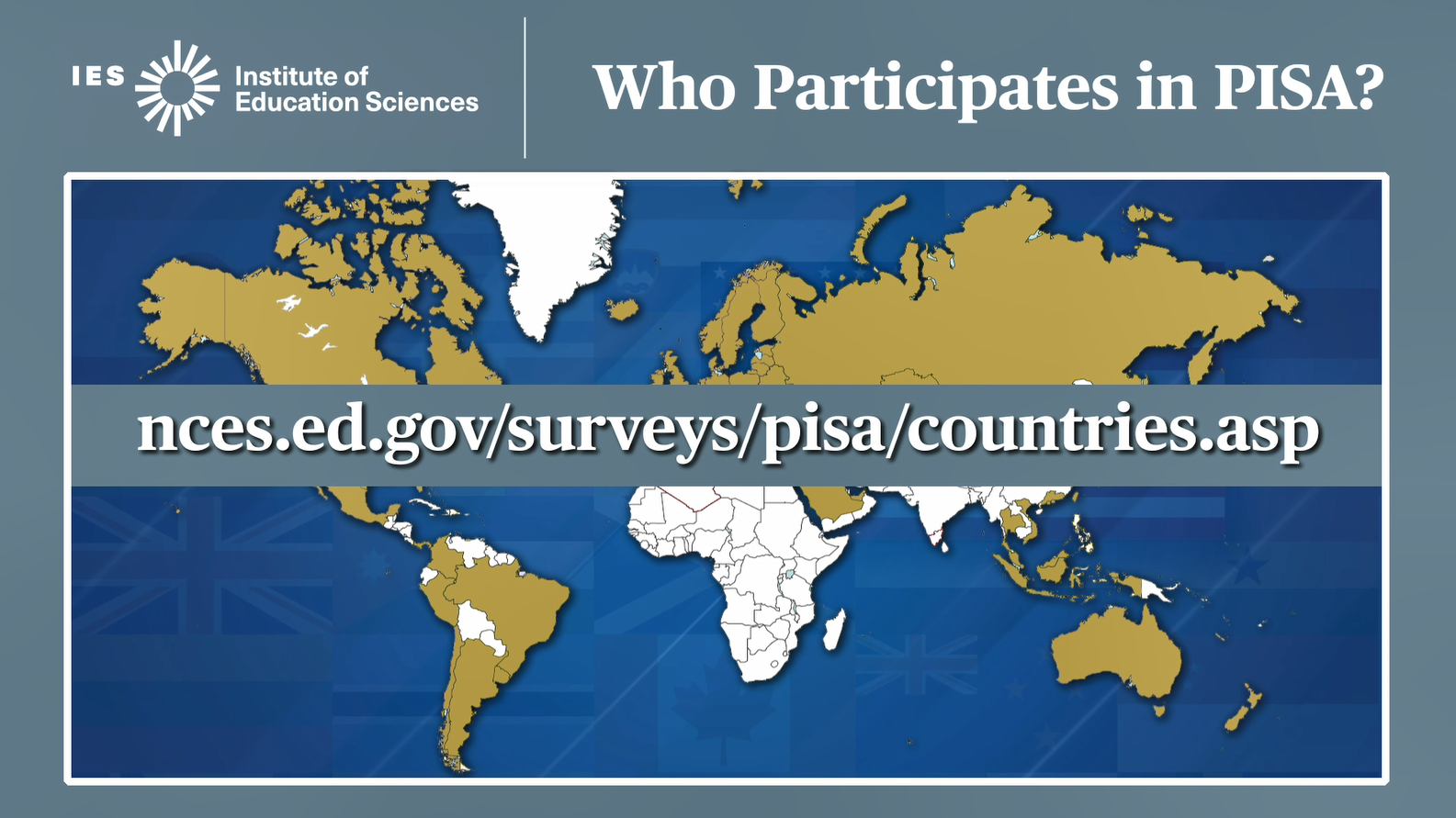
The National Center for Education Statistics website provides a list of each of the countries and education systems that are participating, and provides a look at historical participation in PISA.
REVISED: Screen and text deleted.
Page 104
PREVIOUS:
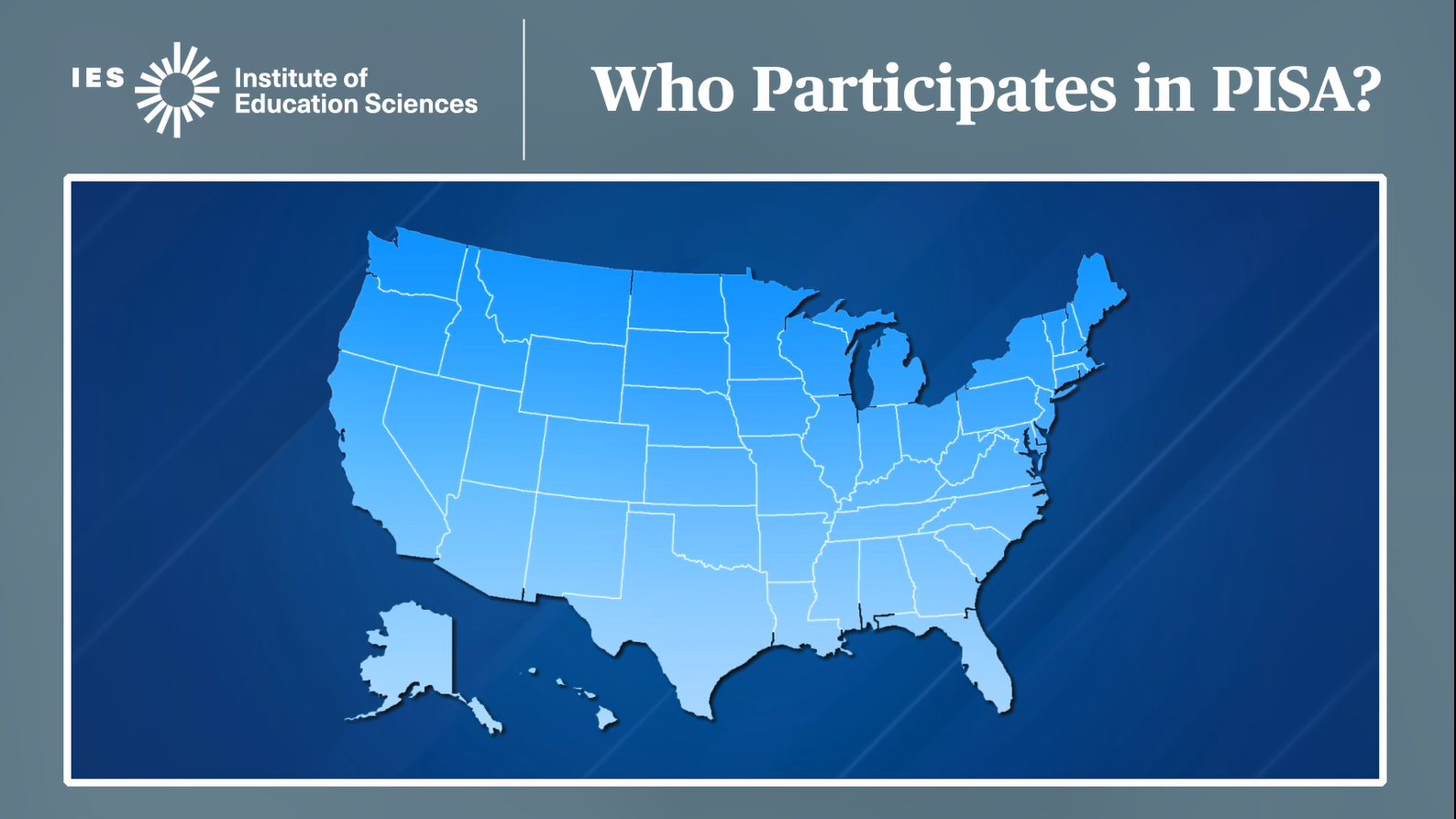
Who
participates in PISA within the United States? PISA samples schools
across the country to take part in the assessment. Not every school
in every state is asked to participate, since PISA relies on a
sample of students and schools to represent all the students and
schools like them across the country.
REVISED: New screen image and text
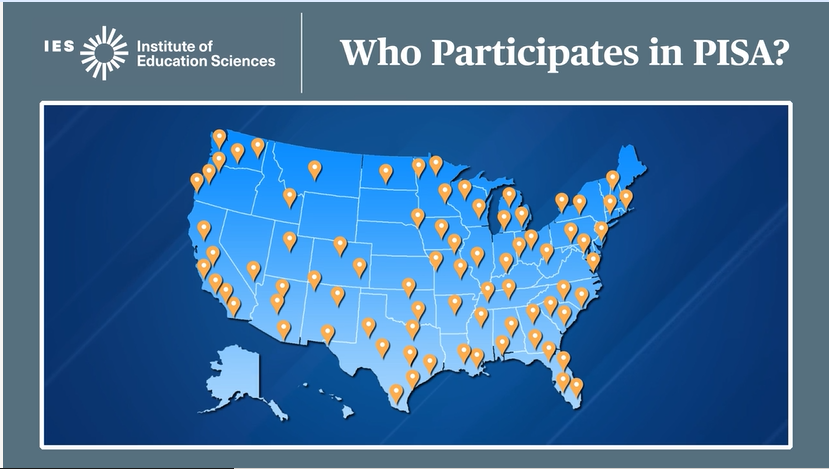
Within the United States, PISA samples schools across the country to take part in the assessment. Not every school in every state is asked to participate, since PISA relies on a sample of students and schools to represent all the students and schools like them across the country.
Page 104
PREVIOUS:
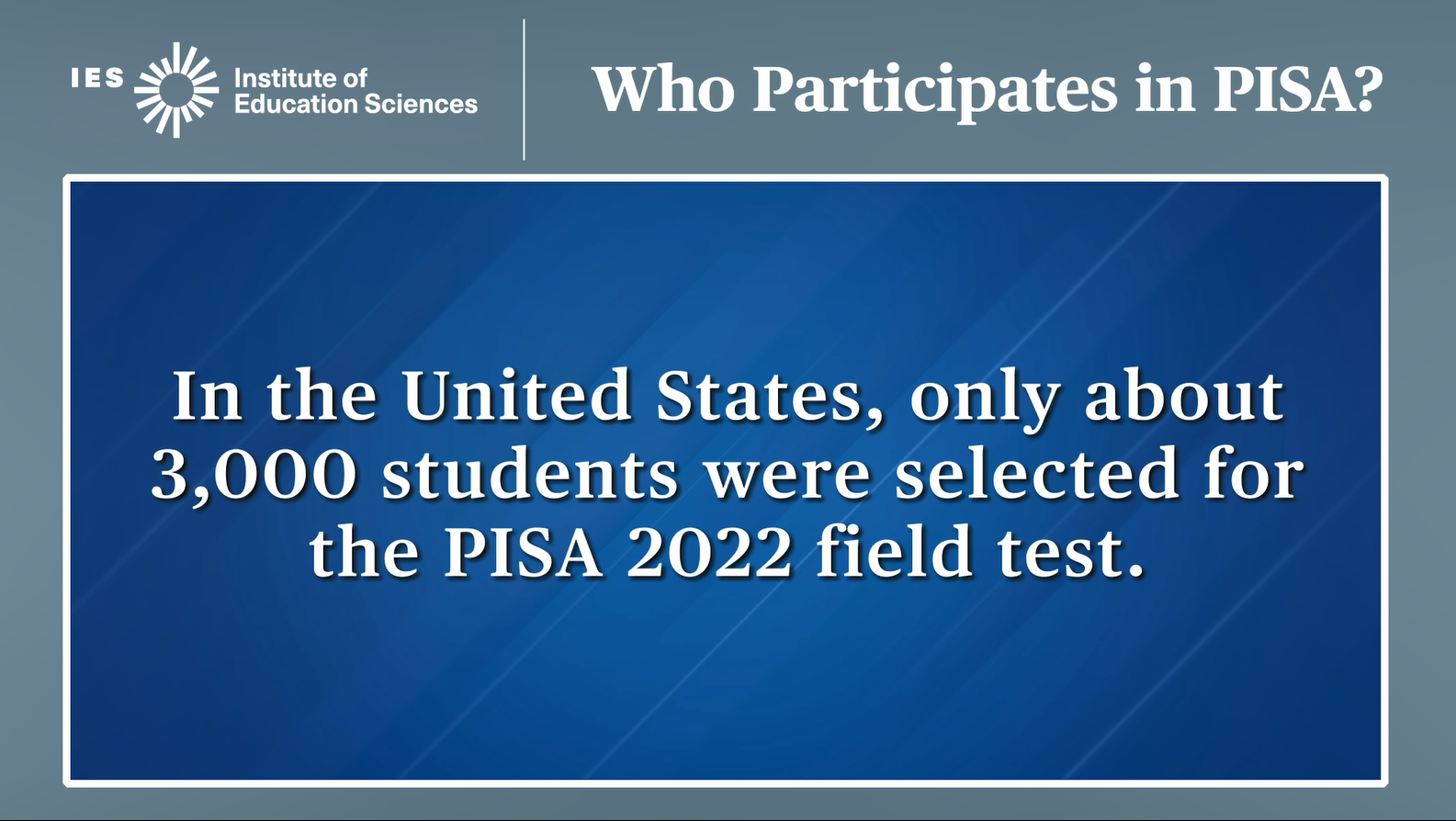
In the United States, only about 3,000
students were selected for the PISA 2025.
REVISED: New screen edit and edit to text to revise student count.
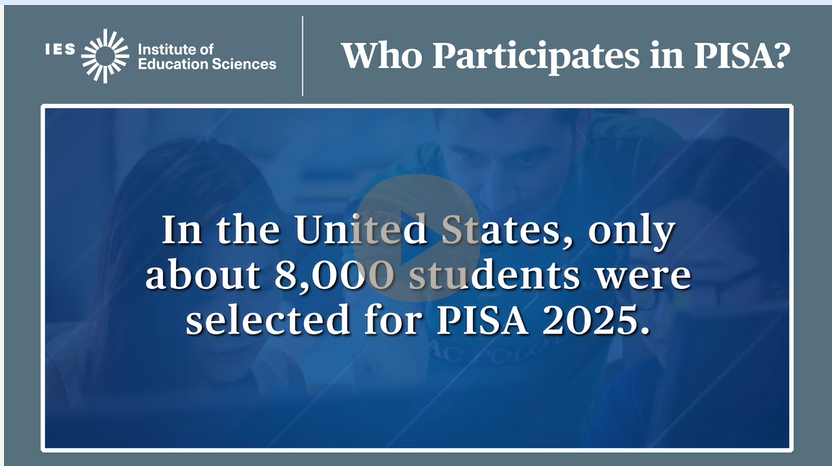
In the United States, only about 8,000 students were selected for the PISA 2025.
Page 105:
PREVIOUS:
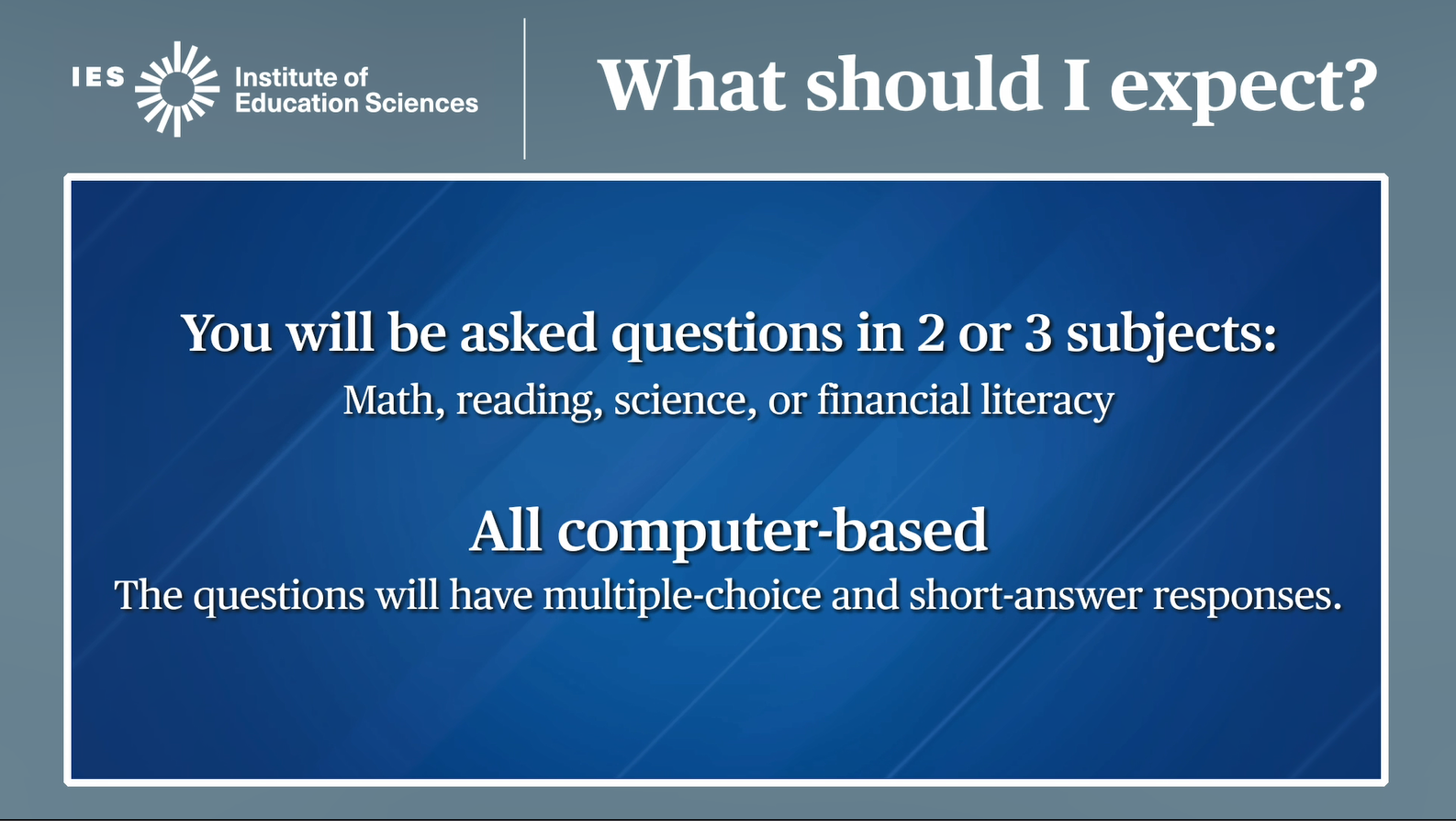
PISA assesses
students’ knowledge and skills in math,
reading, science, or learning in a digital world
science, reading, math, and a new subject this year called learning
in a digital world. On assessment day, you will be asked
questions in two or three of these subjects. The questions will be
based on real-life situations. Remember, PISA is about applying the
knowledge you have learned in and out of school, and not just
memorizing facts. In a few moments we will
show you a sample PISA item.
PISA is
completely computer-based. Assessment
The questions will be multiple-choice and short-answer. There
are no essays or extended writing responses.
PREVIOUS:
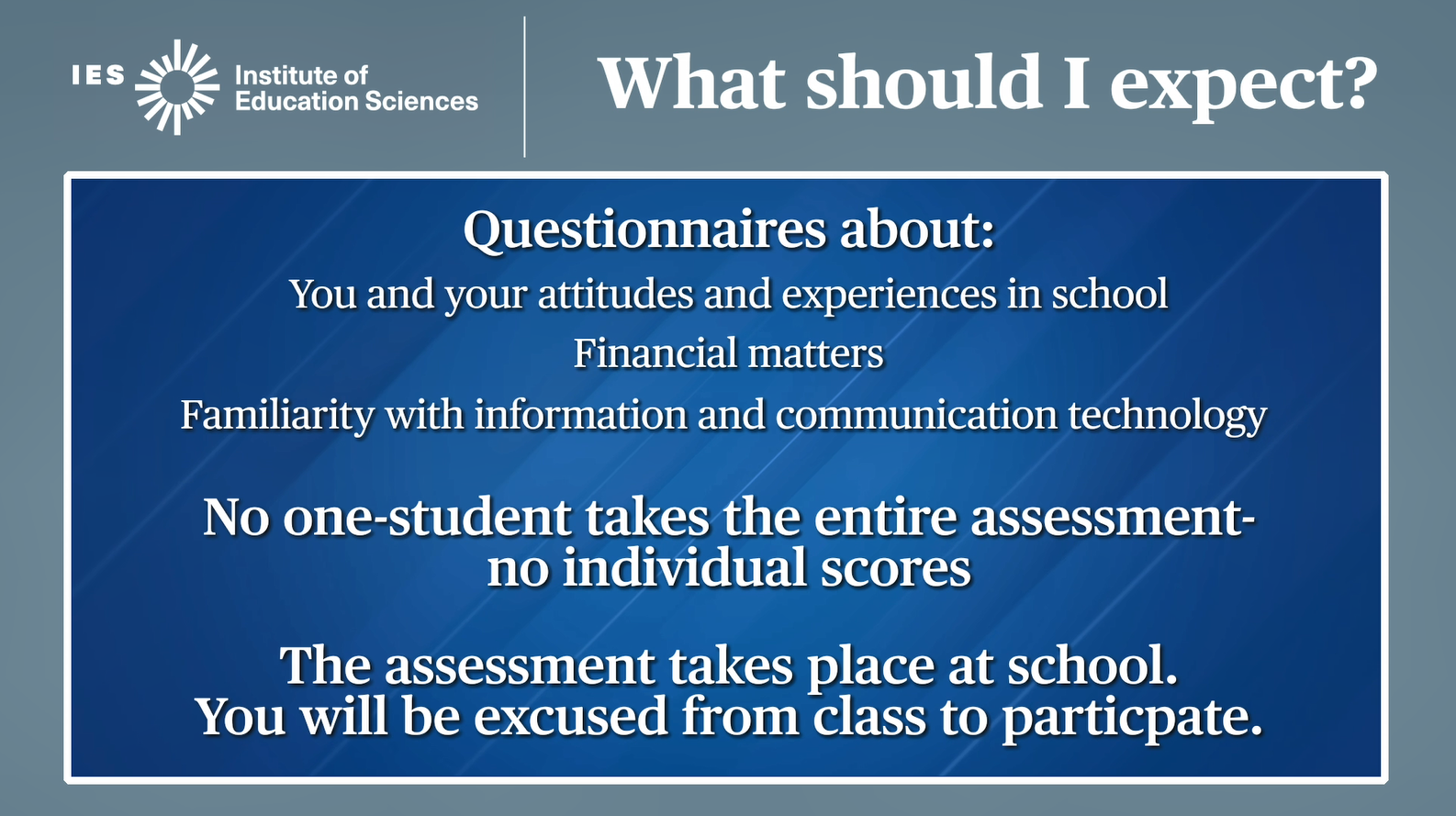
After
the main assessment, you will be asked to complete questions about
your attitudes and experiences in school, your attitudes and
thoughts about learning science subjects, and your familiarity with
information and communication technology. This helps policymakers
learn more about students’ experiences and attitudes and how
they relate to students’ level of knowledge and skills.
Because
no one student takes the entire assessment, unlike many tests you
take, you will not get your own score on PISA.
PISA
takes place at your school. You will be excused from class during
the PISA assessment.
Now,
let’s take a look at an example item from previous PISA tests,
and what you can expect to see on assessment day.
REVISED: Screen and text revised
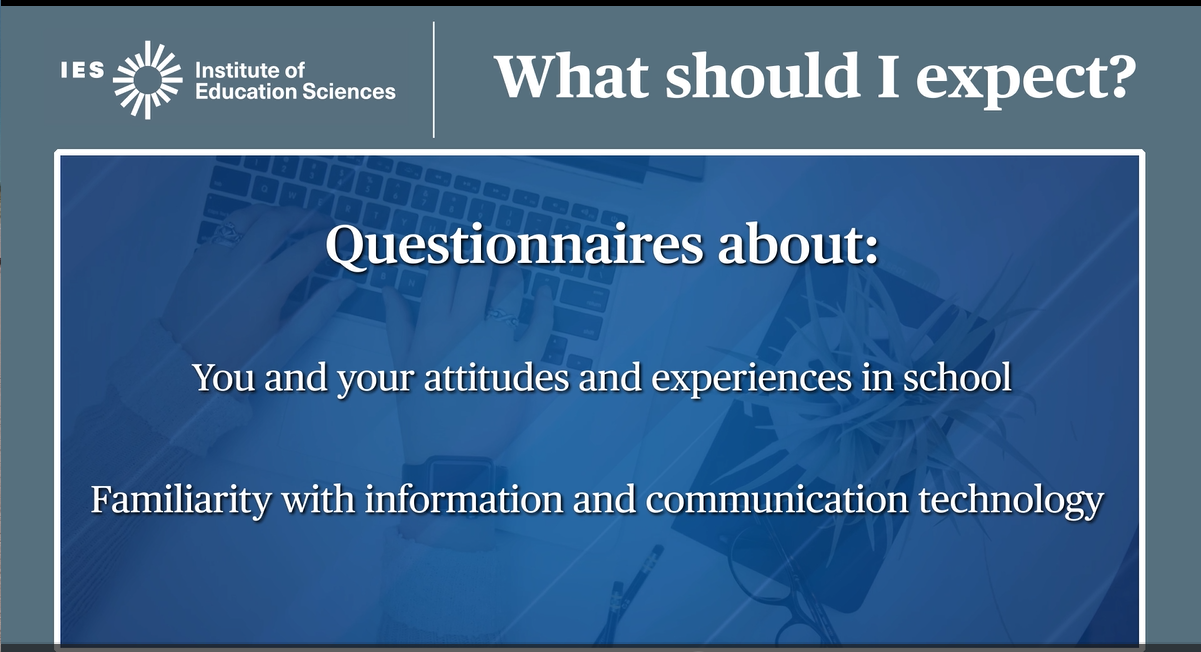
After the subject assessments, you will be asked to complete questions about your attitudes and experiences in school, and your familiarity with information and communication technology. This data helps us learn more about students’ experiences and attitudes and how they relate to students’ level of knowledge and skills.
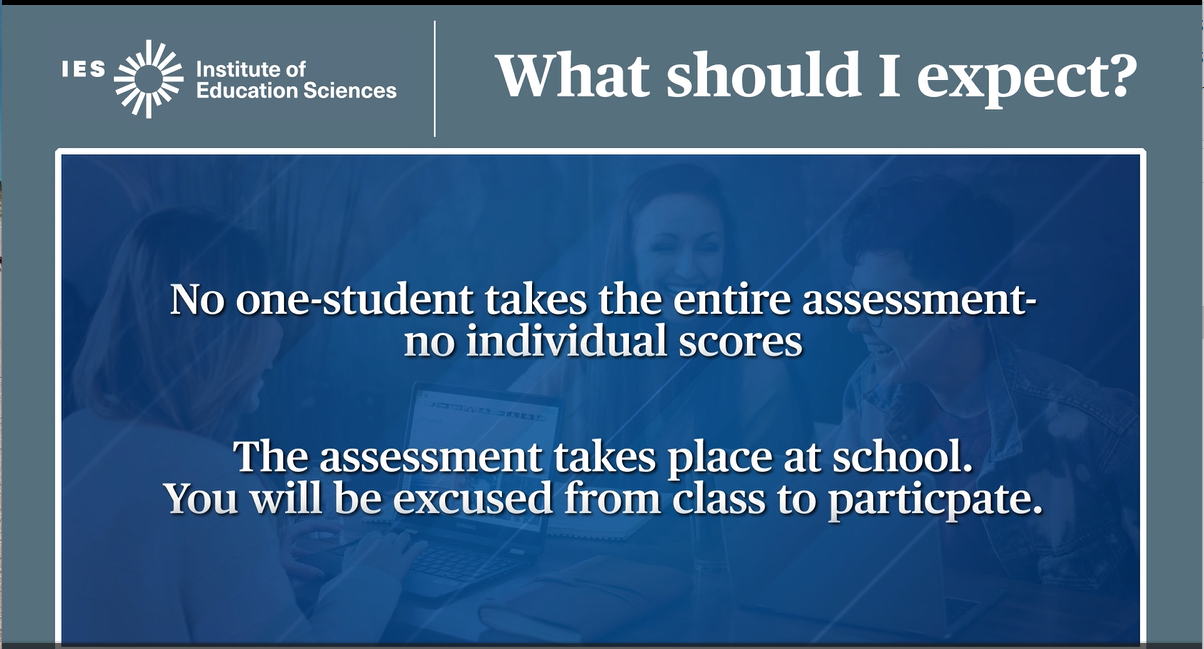
Because no one student takes the entire assessment, unlike many tests you take, you will not get your own score on PISA. And there is no impact on your grades.
Your identity and participation will be kept confidential, and you will not be directly associated with your PISA responses after the assessment.
PISA takes place during school hours. You will be excused from class during the PISA assessment.
Page 106
PISA
items are presented in a layout in which the question, or
description of the problem, is presented on the left side of the
screen.
PISA questions may look very different than some of the other tests you take, so let’s take a look at an example question, and what you can expect to see on PISA day.
PISA questions are typically grouped together by a context or scenario. The question, or description of the problem, is presented on the left side of the screen...
Page 108
PREVIOUS:
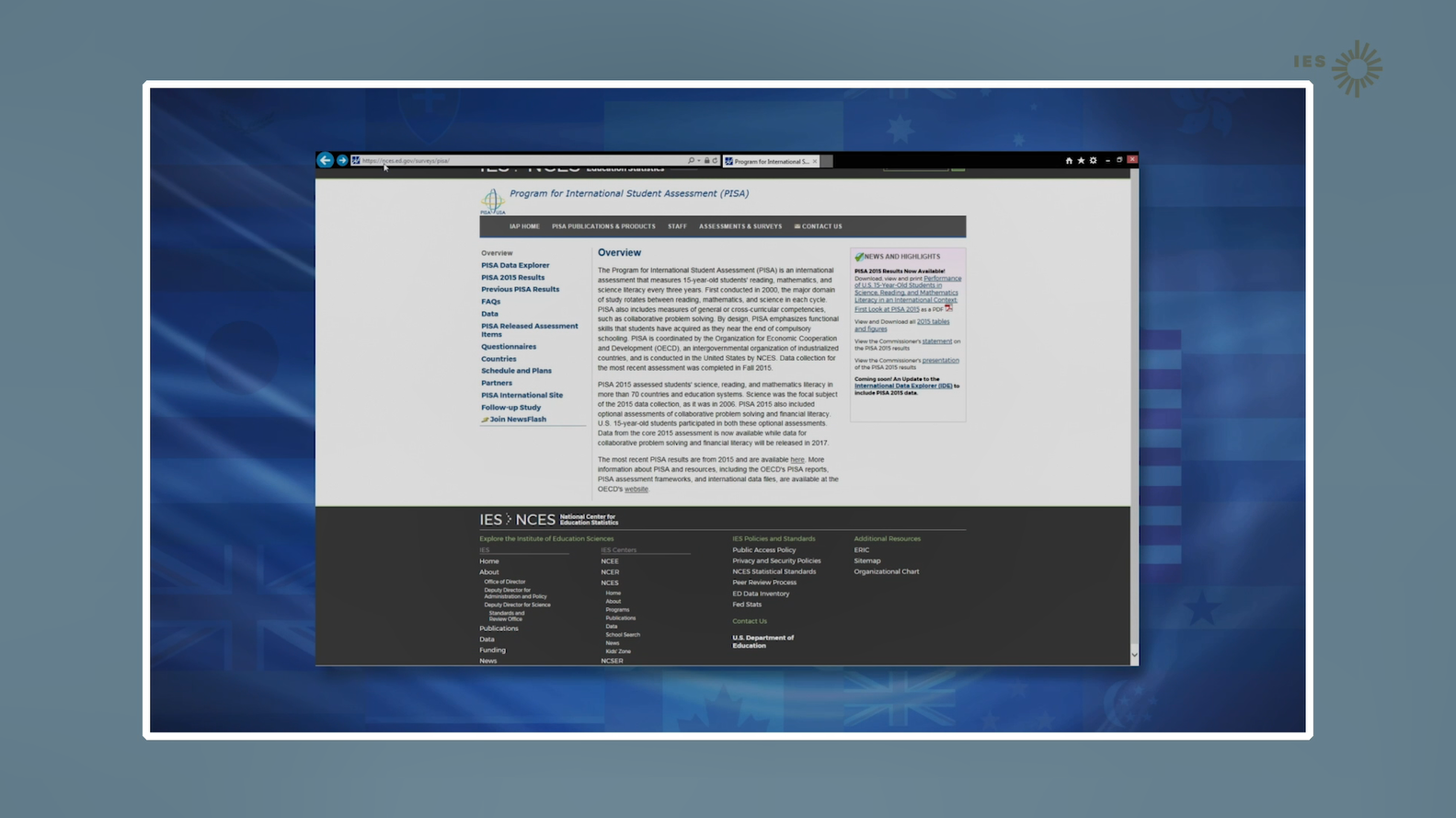
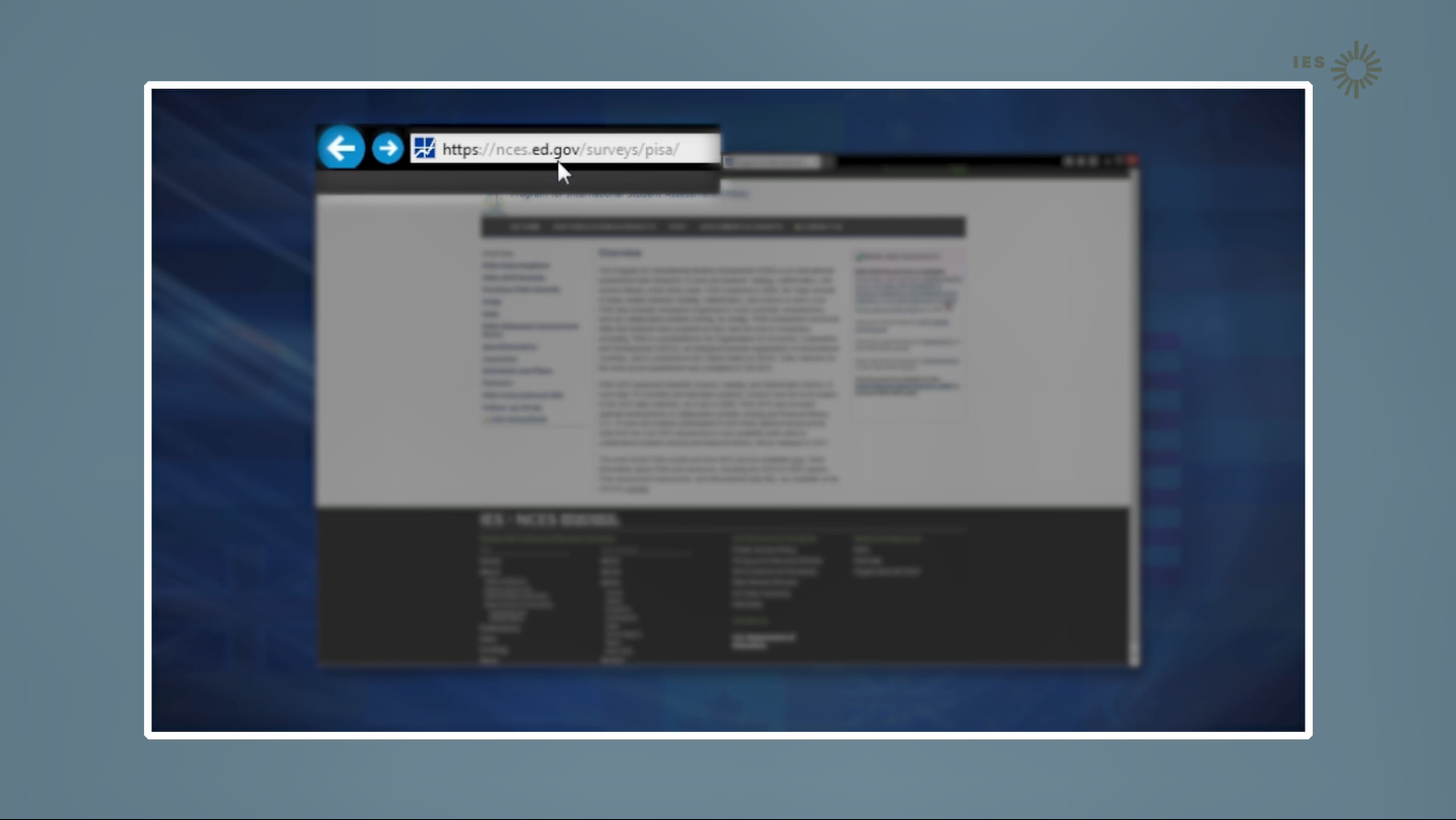
[Highlight
the NCES PISA web address.]
The
International studies website at NCES has questions that are similar
to the ones you will take during the PISA test.
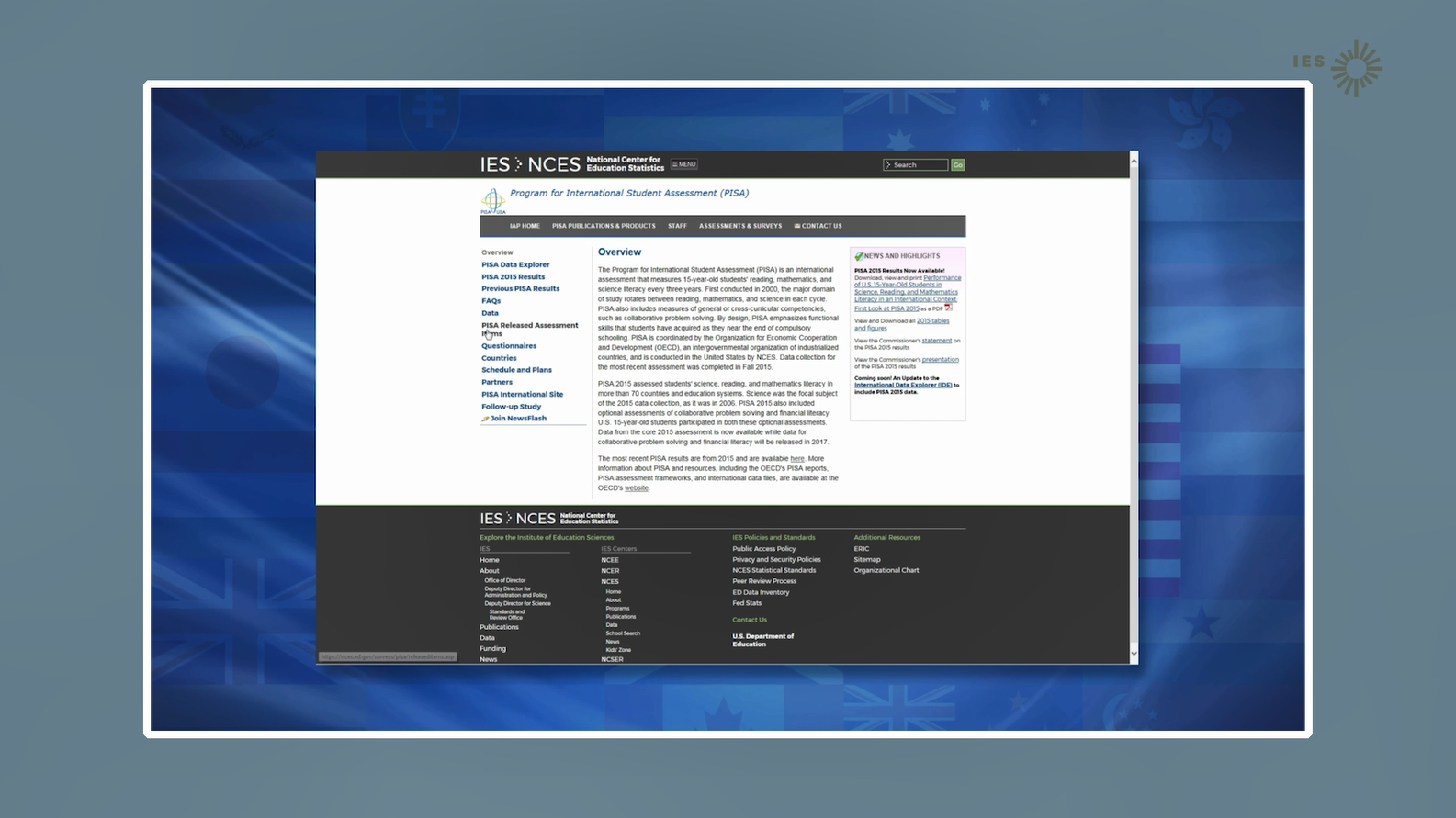
[Website address shrinks back and
study page is clear]
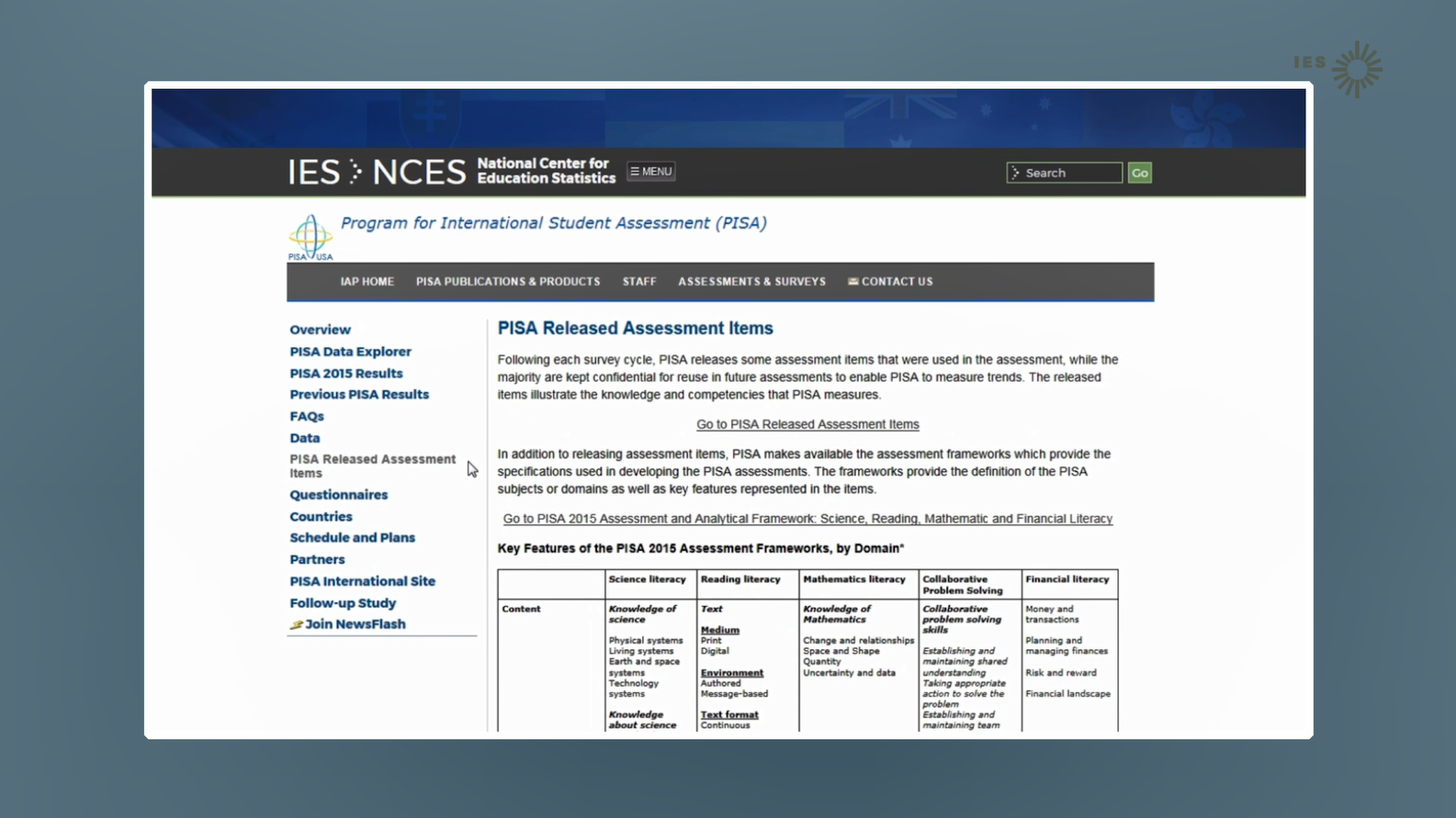
There
are a few computer items that can be shared publically. Assessment
items that are scheduled to be used again cannot be shared
publically because they are confidential, and doing so would
jeopardize the results.
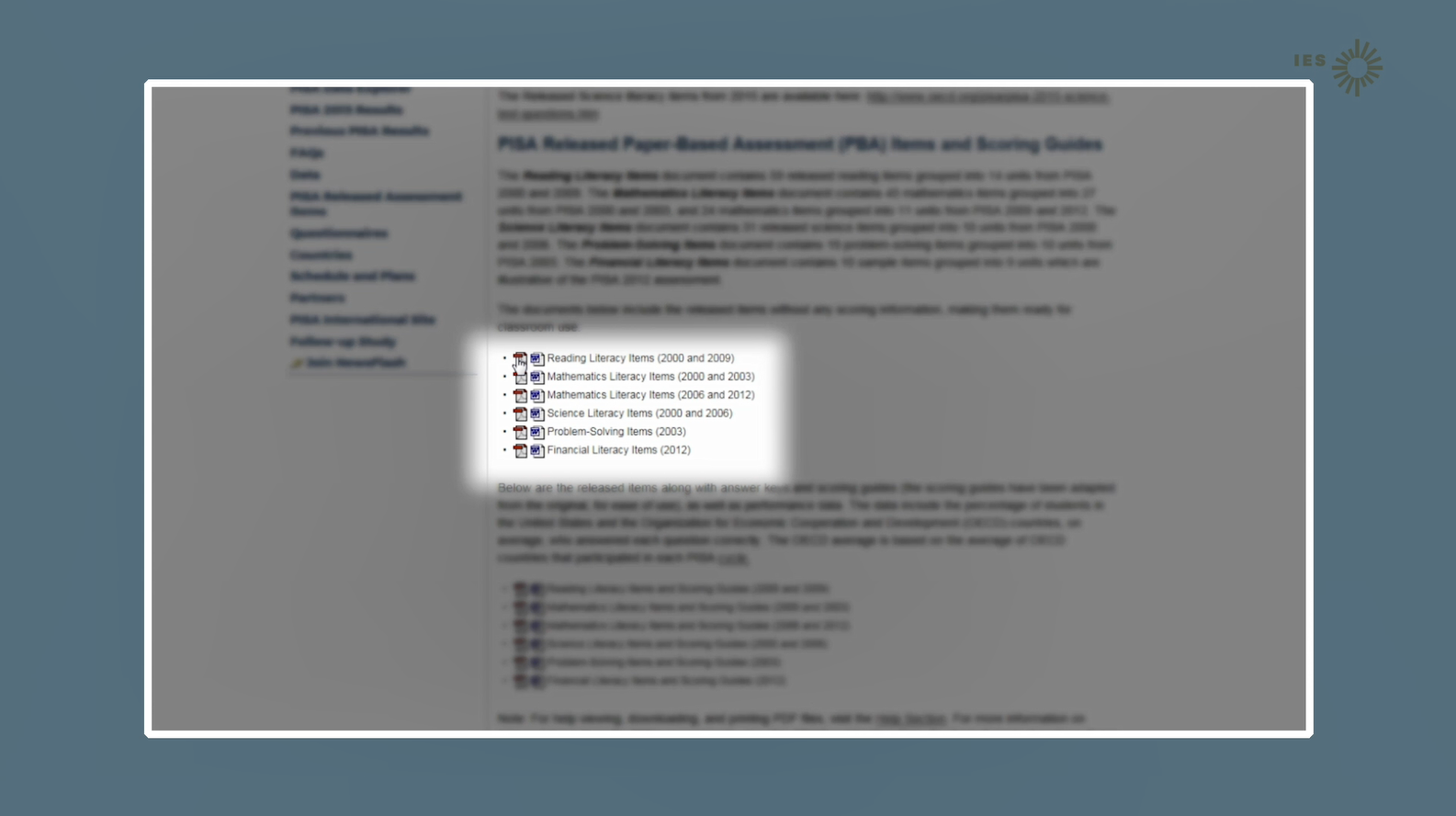
On
the NCES released items page, you can click on the word version or
PDF version of released items.
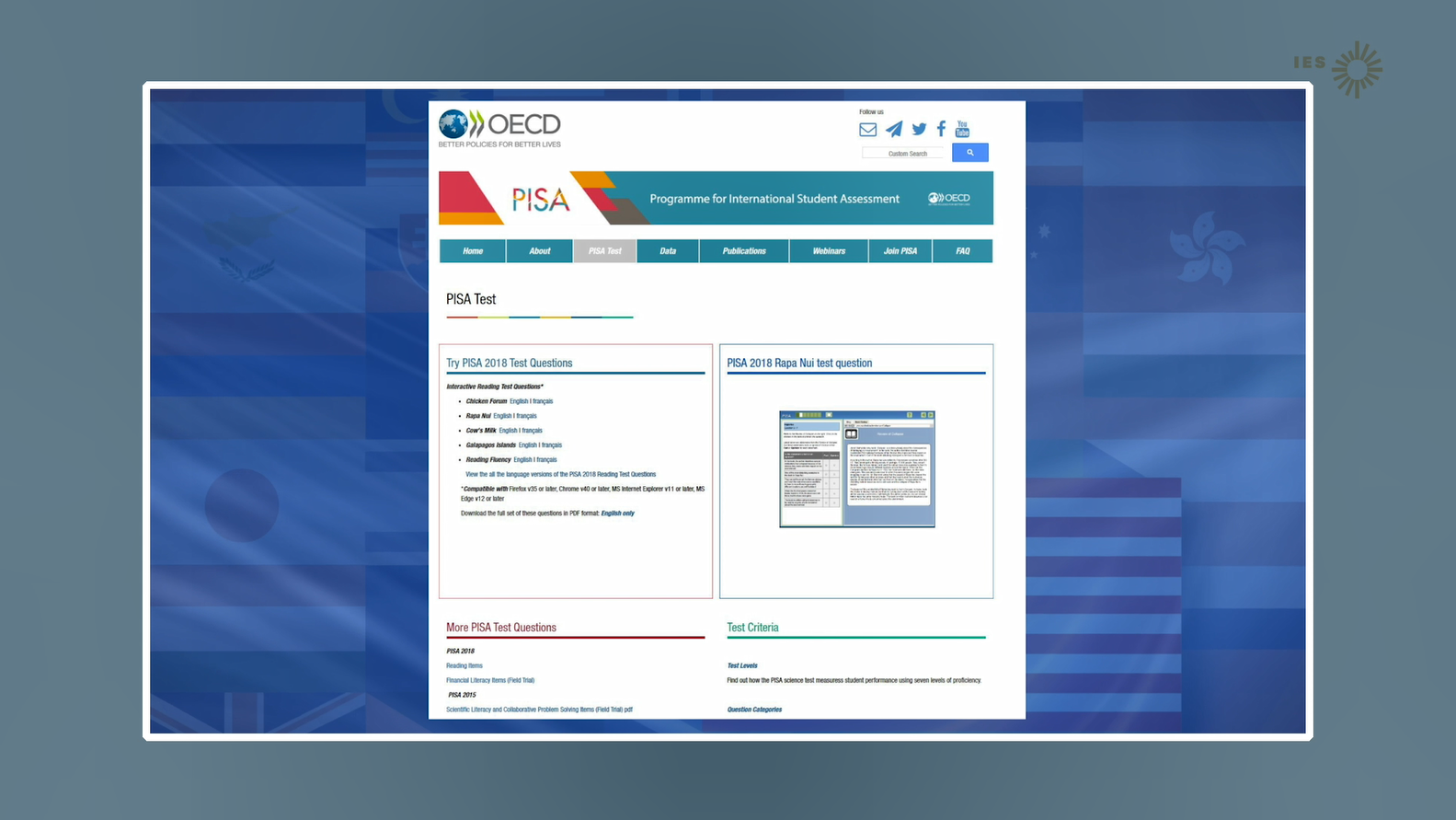
Another
PISA resource with released assessment items and recent PISA results
is the OECD website.
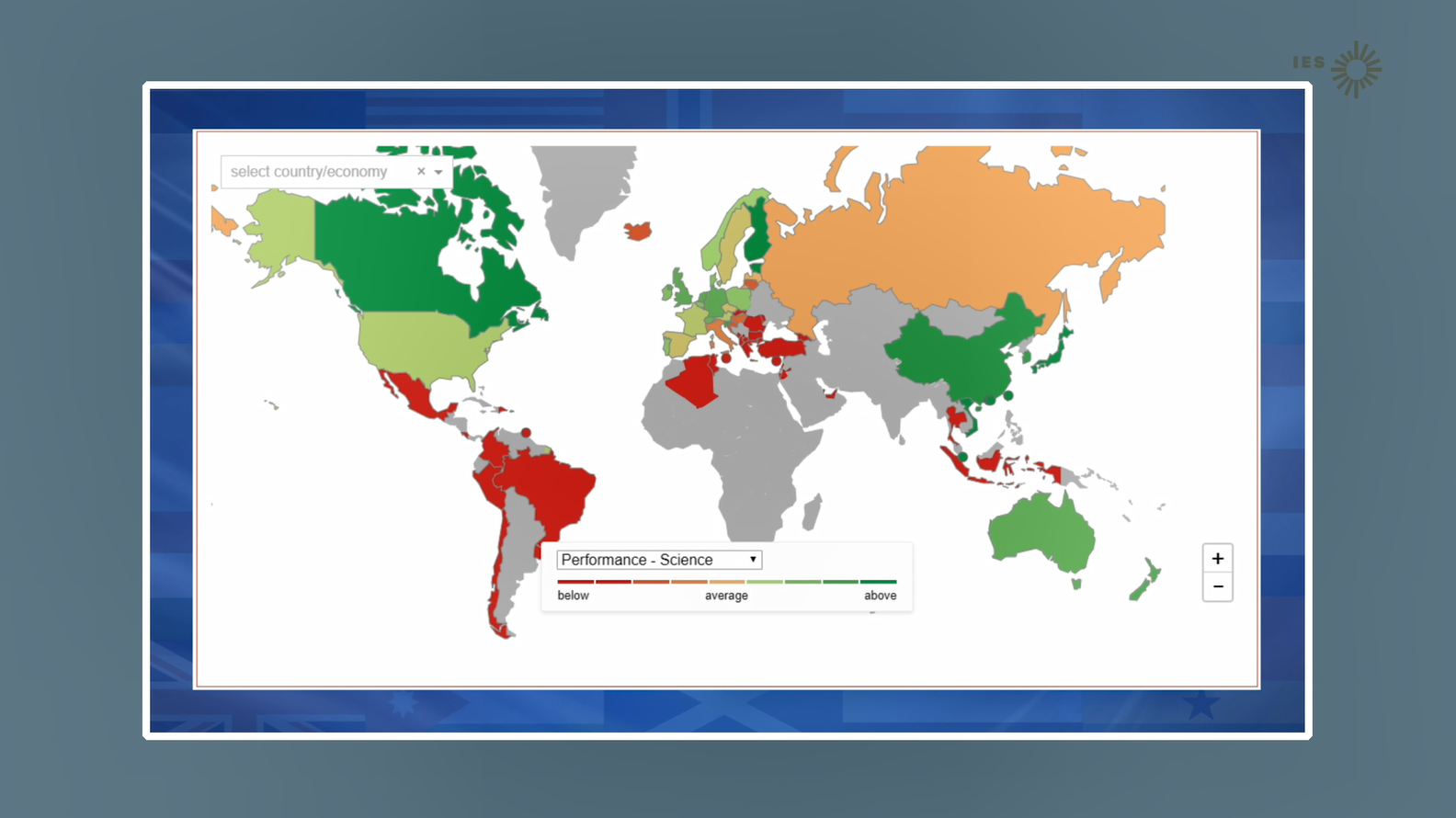
The
OECD website for PISA includes interactive maps,…
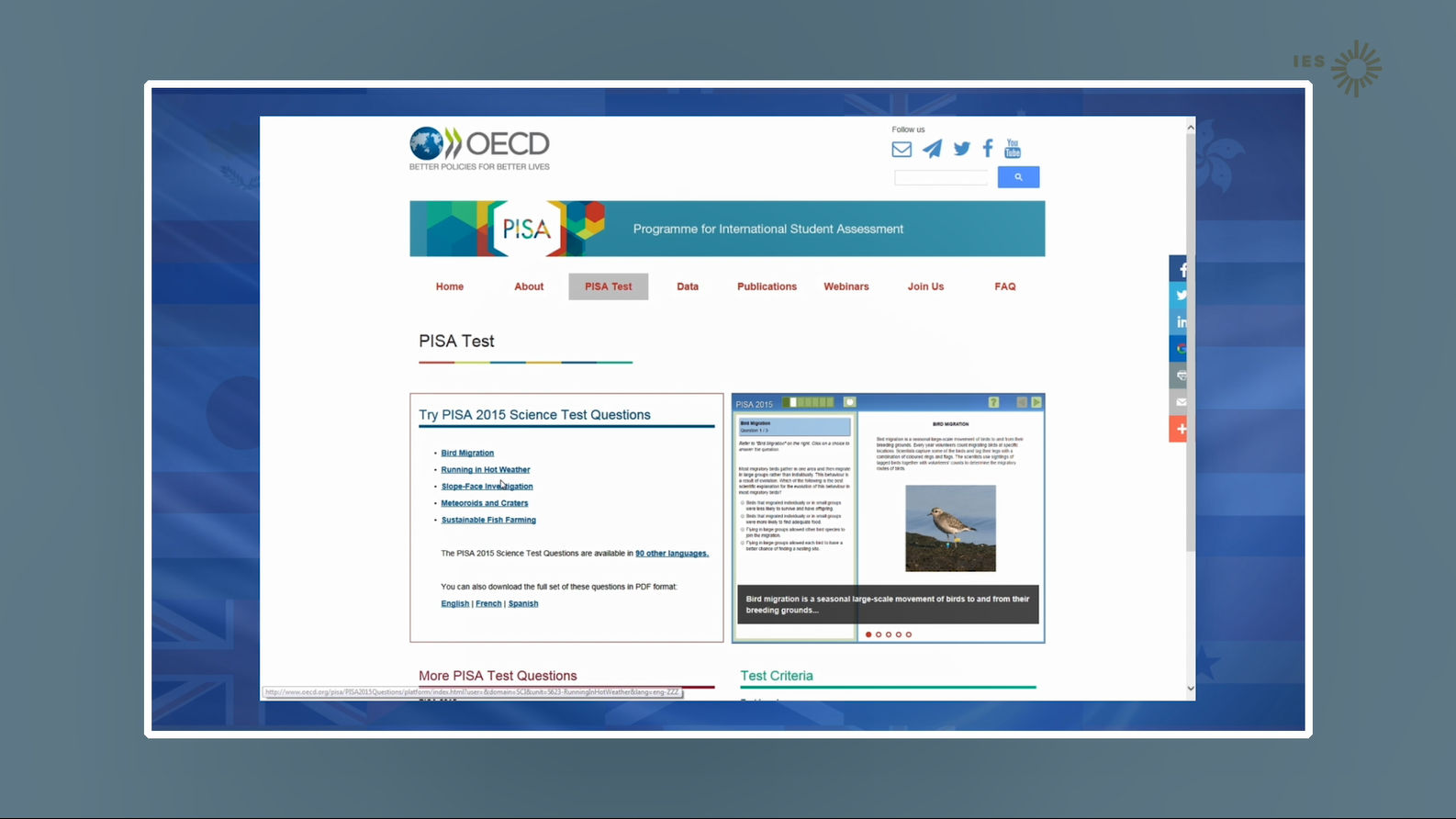
…released
items,
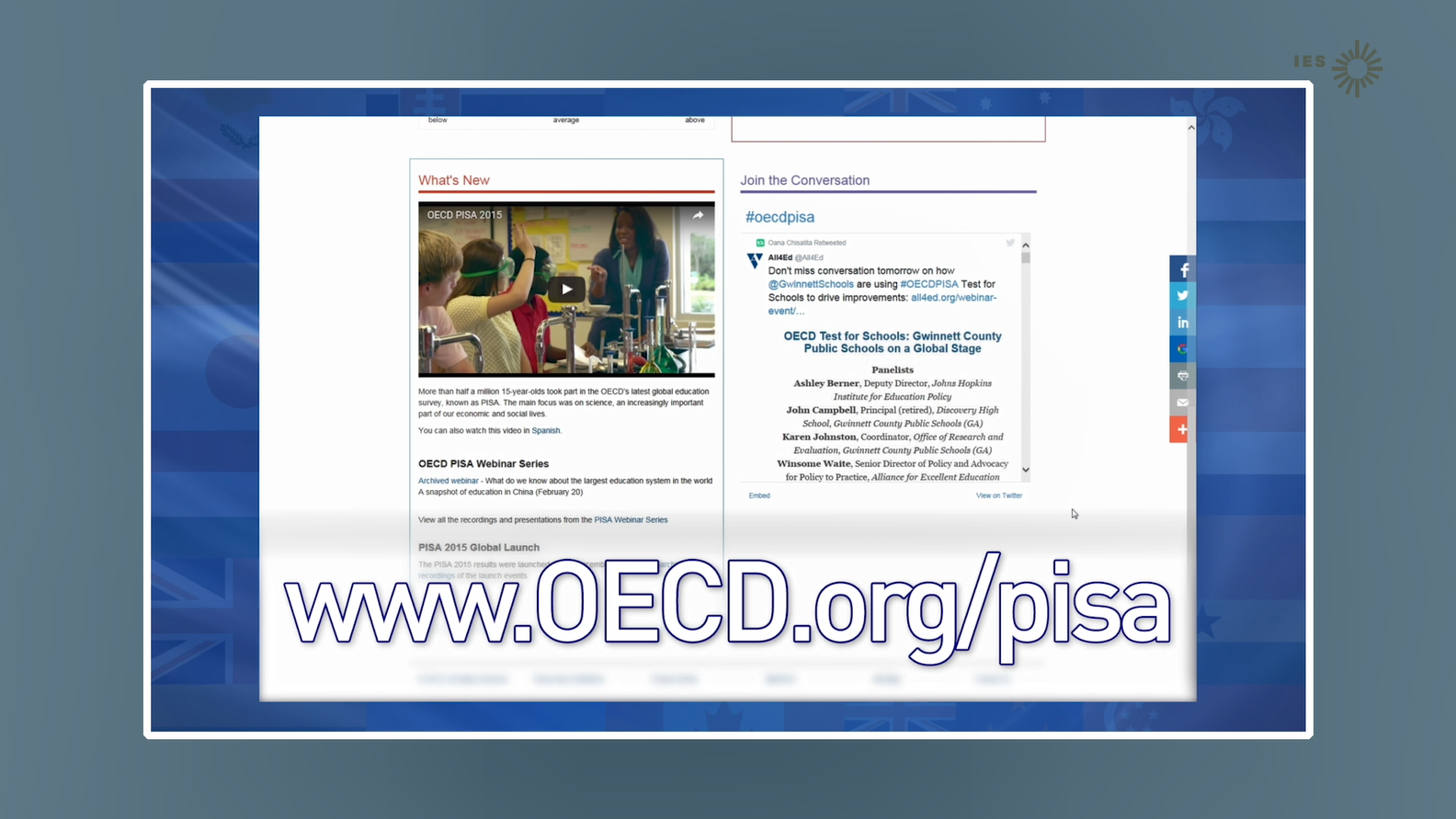
…and
other PISA information and videos.
REVISED: The previous 9 screens were deleted and replaced with a single screen and text.
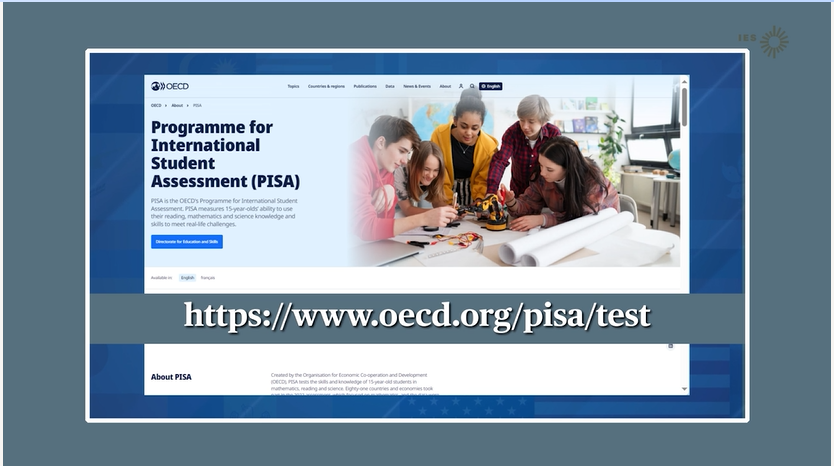
We don’t expect you to study or prepare for PISA. But, if you want to see more examples that are similar to the ones you will take during the PISA test go to the OECD website and search for PISA. You can also find recent PISA results on the OECD PISA website.
Page 109
PREVIOUS:
You play
a crucial role in the success of PISA because you are the most
important part!
Each
student who takes part represents thousands of students across the
nation.
Your
participation can help improve the U.S. education system for future
students.
AND you
are also performing a national service.
REVISED:
You play a crucial role in the success of PISA because you are the most important part! Each student who takes part represents thousands of students across the nation.
Your participation provides representation for other students like you - at your school, within your state, and across the nation - who are not part of the sample.
AND you are also performing a national service. You are helping to understand student abilities and experiences that can lead to better educational outcomes for you and your peers.
Page 110
PREVIOUS:
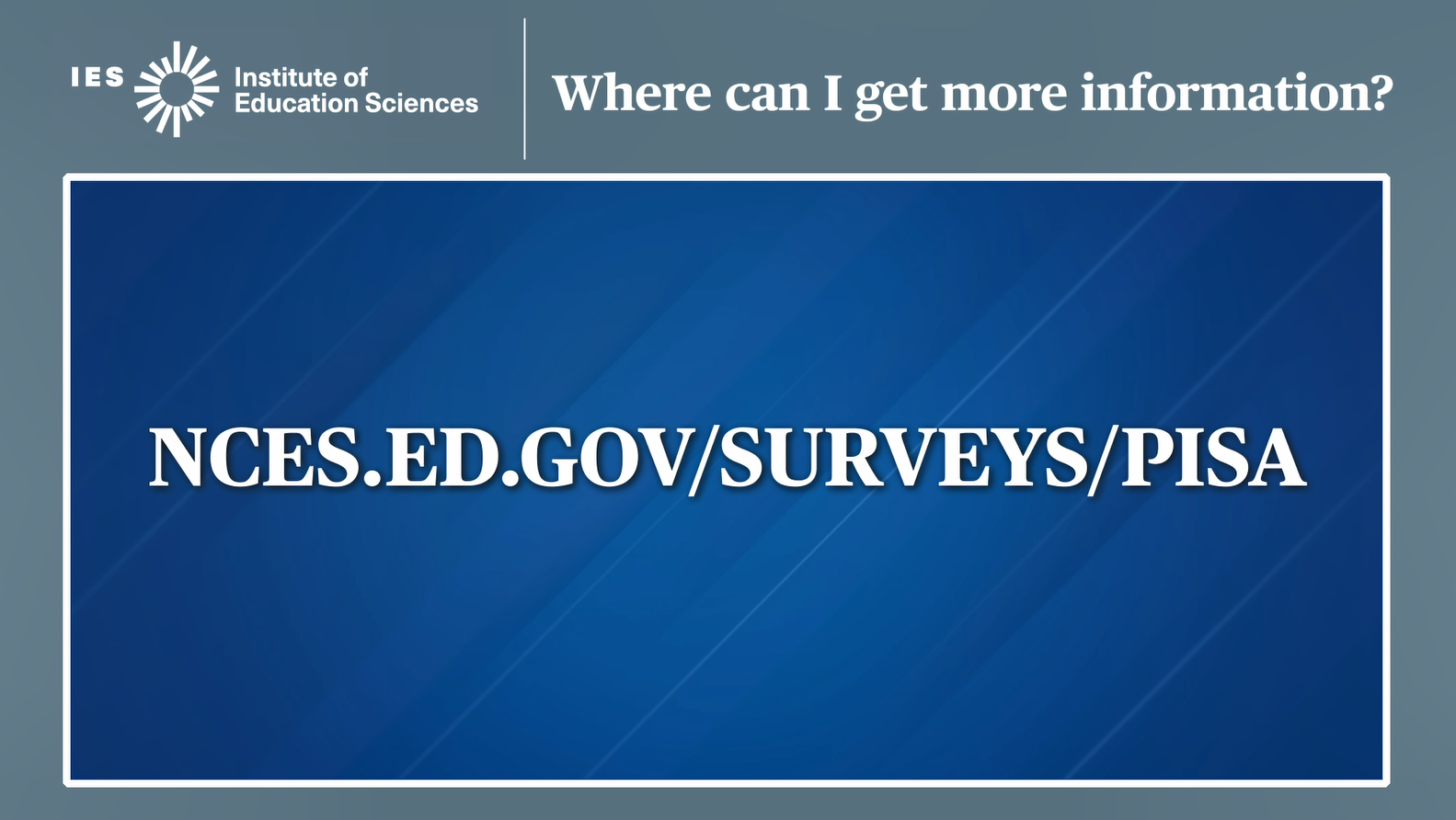
There
is a lot of information about PISA. It is most easily found on the
PISA website at the National Center for Education Statistics.
REVISED: Slight text edit.

There is a lot of information about PISA. It is most easily found on the PISA website at the National Center for Education Statistics, or NCES.
Page 110
PREVIOUS:
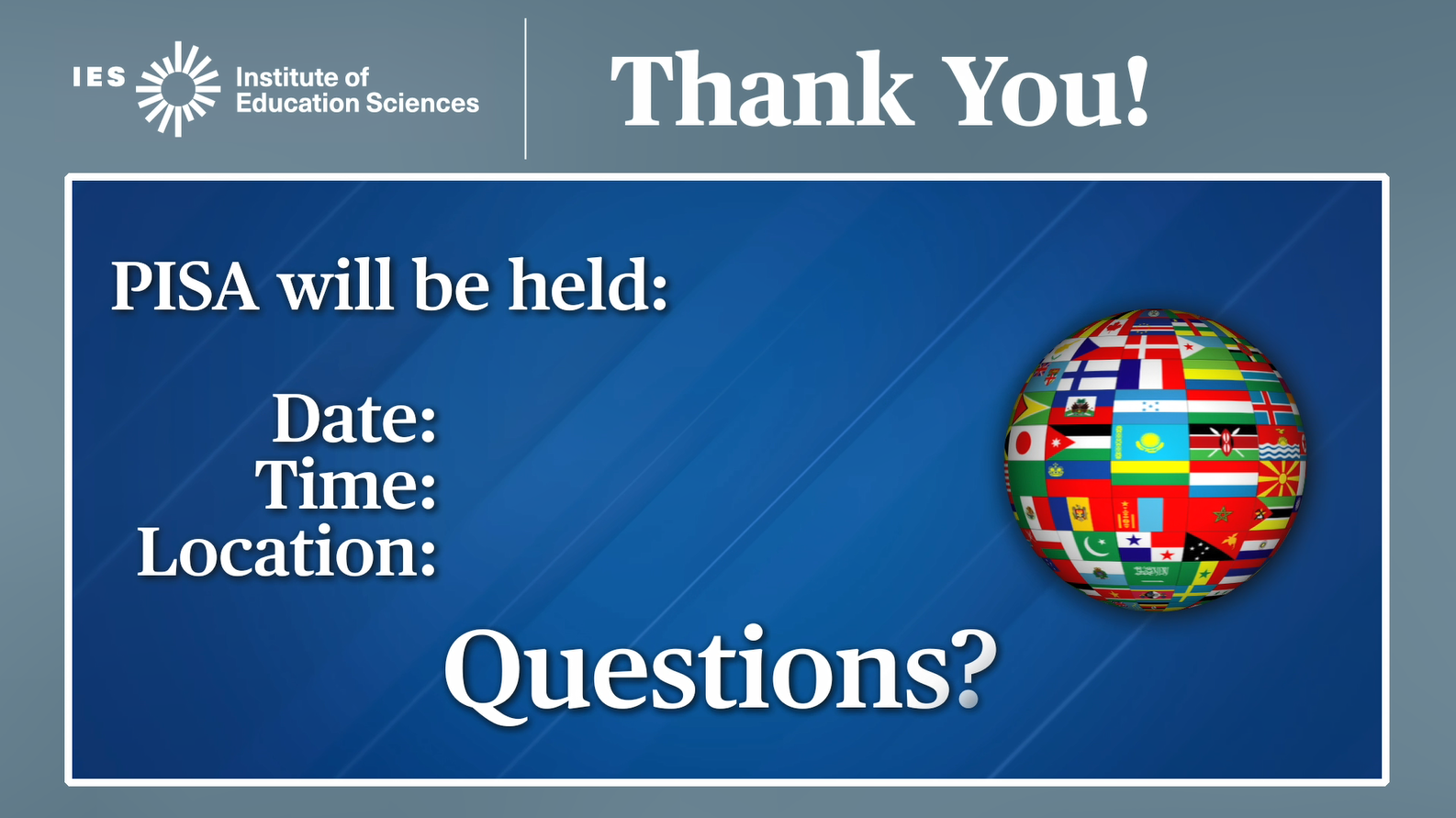
Thank you for your time and for taking part in PISA.
REVISED: Simplified screen and changed text.

Thank you for your time and for taking part in PISA. Your PISA School Coordinator will share with you the details of when PISA is happening in your school and answer any questions you have about the assessment.
Specific material changes to Appendix C-2
This package provides the U.S. versions of the full-scale questionnaires for the 2025 main study. The changes comprise questions that will be deleted based on review and discussion within NCES and feedback from other stakeholders.
PISA includes both student and school questionnaires. In addition, there are two sets of student questionnaires—core and survey questions related to Information Communication Technology (ICT). Due to the size of these files, the submission is broken into three separate files—Student Core (C-2a), Student ICT (C-2b), and School Questionnaire (C-2c).
Deleted from the Student Core Questionnaire (Appendix C-2a)
Table 1. Student Questionnaire – Full Question deletions
Item ID |
Question stem and item text |
Reason deleted |
ST253 |
How many digital devices with screens are there in your home? |
International Consortium decision based on FT result |
ST256 |
How many of the following types of books are in your home? |
International Consortium decision based on FT result. NOTE: Item ST256Q01 was to be deleted by the US. Now the entire question and all items will be removed. |
ST258 |
In the past 30 days, how often did you not eat because there was not enough money to buy food? |
Due to sensitivities to this content, the question will be removed. |
ST278/ ST402 |
What is the floor of your home mostly made of? |
This question has no context in the US. In the field test, this item confused students. |
ST259 |
The scale below represents how society in <country of test> is set up.
At the top of the scale (value 10) are the people who are the best off. They earn the most money, receive the best education, and have the most respected jobs.
At the bottom of the scale (value 1) are the people who are the worst off. They earn the least money, receive no education, and have no jobs or the least respected jobs.
|
Due to sensitivities to this content, the question will be removed. NOTE: This question is also deleted in the International source questionnaire. |
ST228 |
How many of the following people usually live at your main home with you? |
In the PISA 2025 FT, questions aiming to capture information about modern living arrangements and about parents’ education and occupation were introduced. timing data indicates that students a spent long time in questions ST228 and ST229 and layout may be challenging for students in some countries. Also, the response categories in the drop-down list may not be realistic for mother or female guardian/father or male guardian (e.g., “five or more”). |
ST229 |
How many of the following people usually live at your homes with you?
|
Same comment as ST228. |
ST407 |
Does your parent or guardian have a paid job? |
International Consortium decision based on FT result |
ST464 |
On a scale from 1-10, how would you rate the quality of your science instruction this school year? |
International Consortium decision based on FT result |
ST530
|
When learning science topics at school, how often do the following activities occur? Q01) Students are given opportunities to explain their ideas. Q02) Students spend time in the laboratory doing practical experiments. Q03) Students are allowed to design their own experiments. Q04) There is a class debate about investigations. Q05) Students are asked to do an investigation to test ideas. Q06) Students have the opportunity to repeat experiments and compare observations. Q07) Students carry out practical work. Q08) Students write up laboratory reports. Q09) Students present something to the rest of the class. Q10) Students are given time to research scientific ideas from a range of sources. Q11) Students are able to choose different methods (e.g., field studies, experiments, simulations) to conduct investigations. Q12) Students compare and evaluate different experimental designs. Q13) Students interpret data and make judgements about its accuracy. Q14) Students design their own projects under the guidance of teachers. |
International Consortium decision based on FT result |
Item ID |
Question stem and item text |
Reason deleted |
ST534 |
When learning science topics at school, how often do the following activities occur? Q01) Students are required to debate science questions. Q02) Students are asked to draw conclusions from an experiment they have conducted. Q03) The teacher explains how a science idea can be applied to a number of different phenomena (e.g., the movement of objects, substances with similar properties). Q04) Students design their own experiments. Q05) Students are required to engage in discussions among themselves. Q06) Use scientific information from diagrams, graphs, or simulations to support an argument Q07) Uses scientific solutions to solve real life challenges Q08) Identifying scientific aspects of a real-world problem Q09) Students compare sources of scientific information to determine their reliability Q10) Students are asked to consider the ethics of scientific investigations Q11. Students develop and carry out experiments with teacher guidance
|
International Consortium decision based on FT result |
ST467 |
When learning science topics at school, how often do the following activities occur? Q01TA) Students provide evidence to support arguments about scientific questions. Q02TA) Students use evidence from experiments to support their conclusions Q03TA) Students determine which variables need to be controlled in an experiment. Q04TA) There is a class discussion about how to solve scientific problems. Q05TA) Students are encouraged to question and critique scientific arguments made by other students. Q06TA) Students discuss how scientists develop theories among themselves. Q07TA) The teacher asked us to explain our reasoning during a discussion about scientific theories. |
International Consortium decision based on FT result |
ST466 |
This school year, how often did your teacher do the following things in your science lessons? Q01JA) The teacher explained how new and old topics were related. Q02JA) The teacher summarized what we learned at the end of the lesson. Q03JA) The teacher explained at the beginning of the lesson what the learning goals are. Q05JA) The teacher gave different work to those of us who had difficulties learning. Q06JA) The teacher gave different work to those of us who could advance faster. Q08JA) The teacher asked us to discuss with each other what we learned. Q09JA) The teacher read to us from a <textbook>. Q10JA) The teacher explained how scientific discoveries can help people in their everyday lives. Q11JA) The teacher demonstrates a scientific idea by using an experiment or model. Q12JA) The teacher explained how scientific knowledge is generated and refined over time.
|
International Consortium decision based on FT result |
ST107 |
How often do these things happen in your lessons for this science course? Q01NA) The teacher adapts the lesson to my class’s needs and knowledge. Q02NA) The teacher provides individual help when a student has difficulties understanding a topic or task. Q03NA) The teacher changes the structure of the lesson on a topic that most students find difficult to understand. Q04NA) The teacher provides individual support for advanced students. Q05NA) The teacher plans a lesson based on each students’ individual learning needs when required. Q06NA) The teacher creates assessments based on each students’ individual learning needs when required. Q07NA) The teacher changes the way in which they teach students based on their preferred learning style. |
International Consortium decision based on FT result |
ST508 |
During your science lessons, does your teacher do the following? Q01NA) Discuss the homework in class. Q02NA) Monitor whether homework was completed. Q03NA) Correct homework assignments. Q04NA) Give you feedback on your homework.
|
International Consortium decision based on FT result |
ST494 |
To what extent do you agree or disagree with the following statements? Q03JA) Science is one of my favorite subjects. Q06JA) Science is easy for me. Q09JA) I want to do well in my science class. |
International Consortium decision based on FT result |
ST113
|
How much do you agree with the statements below? Q01TA) Making an effort in my science classes is worth it because this will help me in the work I want to do later on. Q02TA) What I learn in my science classes is important for me because I need this for what I want to do later on. Q03TA) Studying science is worthwhile for me because what I learn will improve my career prospects. Q04TA) Many things I learn in my <school science> subject(s) will help me to get a job. SQ05DA) Studying science is worthwhile for me because what I learn will improve my career prospects.
|
International Consortium decision based on FT result |
ST130 |
How much do you agree with the statements below? Q01NA) Learning advanced science topics would be easy for me Q02NA) I can usually give good answers to test questions on science topics Q03NA) I learn science topics quickly Q04NA) science topics are easy for me Q05NA) When I am being taught science, I can understand the concepts very well Q06NA) I can easily understand new ideas in science Q07DA) I get higher grades in science than my peers do Q08DA) I consistently get good grades in science Q09DA) I get higher grades in science than I do in other subjects |
International Consortium decision based on FT result |
ST497 |
How much do you agree or disagree with the following statements about what you have learnt in school about environmental issues? Q01) I have participated in my school’s decision-making processes about environmental issues. Q02) What I learn in school encourages me to consider what I can do to impact the local environment positively. Q03) What I learn in school encourages me to positively impact national and global environmental issues (e.g., Climate change). Q04) I have learned in school that when I use more energy at home, I might be contributing to global climate change. Q05) I have learned in school that most plastic bags do not biodegrade and instead they break into smaller parts and enter the food chain. Q06) I take part in activities organized by the school to help improve the living conditions of others (e.g., those affected by drought, wildfires, or food shortages). Q07) As a result of what I have learned in school, I have become more respectful of other cultures’ knowledge about the environment. Q08) I take part in activities organized by my school to improve habitats for other living things. Q09) As a result of what I have learned in school, I know how to positively impact the environment whilst working with others. \Q10) I have learned in school how others are positively impacting the environment. Q11) At school, I have learned to eat sustainably. Q12) From school I have learned that I can make a difference. |
International Consortium decision based on FT result |
ST463 |
How informed are you about the following aspects of Human-caused, induced climate change? Q01DA) The difference between natural and human-caused, climate change Q02DA) The relationship between global warming and climate change Q03DA) The difference between weather and climate Q04DA) The causes of global warming Q05DA) The effects of global warming Q06DA) The varying impacts of climate change |
International Consortium decision based on FT result |
ST093 |
Do you think problems associated with the environmental issues below will improve or get worse over the next 20 years? Q01TA) Air pollution Q09DA) Energy shortages Q03TA) Extinction of plants and animals Q10DA) Loss of biodiversity Q04TA) Clearing of forests for other land use Q05TA) Water shortages Q11DA) Water pollution Q06TA) Nuclear waste Q07NA) The increase of greenhouse gases in the atmosphere Q12DA) The causes of climate change Q13DA) The effects of climate change Q14DA) That humans have contributed to changes in our climate systems Q15DA) Effects of plastic pollution Q16DA) Causes of food waste Q17DA) Advantages of renewable Energy Q18DA) Climate change impacts varies across nations Q19DA) Effects of sea level rise |
International Consortium decision based on FT result |
ST503
|
Why do you participate in additional science instruction in this school year? Q01NA) I want to learn more. Q02NA) I want to prepare for exams. Q03NA) My teachers recommended it. Q04NA) My parents recommended it. Q08NA) My friends participate in it. Q05NA) I want to improve my grades. Q06NA) I need help understanding the class material. Q07NA) It is necessary for a job that I would like to have in the future.
|
International Consortium decision based on FT result |
ST504 |
Do you attend more or less hours of additional instruction per week during holidays or during test preparation times (e.g. prior to final exams)? Q01NA) During test preparation Q02NA) During holidays |
International Consortium decision based on FT result |
ST505 |
Who are the providers of your additional science instruction? Q01) Teachers from my regular school Q02) Teachers from other schools Q03) Tutors or instructors from a business or commercial company Q04) Tutors or instructors from the school district Q05) Tutors or instructors from a not-for-profit organization or community club Q06) Computer software or app from a business or commercial company Q07) Computer software or app from the school district Q08) Computer program from a not-for-profit organization or community club Q09) An older student |
International Consortium decision based on FT result |
ST510 |
How is this additional instruction paid for? Q01) District pays for or provides it. Q02) My school pays for or provides it. Q03) My family pays for it. Q04) I pay for it. Q05) Other people or organizations pay for it (e.g. foundations, friends). Q06) Nobody pays for it. Q07) I do not know |
International Consortium decision based on FT result |
ST511 |
Where do you attend this additional instruction? Q01) In my regular school building Q02) At some other place, i.e., not in my regular school building Q03) Online |
International Consortium decision based on FT result |
ST512 |
How many years altogether have you attended additional instruction? |
|
ST507 |
In a typical school week, approximately how many hours do you spend studying in the following subjects? Q01) Science Q02) English/Language Arts Q03) World language (other than English/Language arts) Q04) Total time for all studying in all subjects, including subjects not listed above
|
International Consortium decision based on FT result |
ST509 |
How often do you do these things? Q01TA) Watch TV programs about science Q02TA) Borrow or buy books or magazines on science topics Q03TA) Visit web sites about <school science> topics Q04TA) Read science magazines or science articles in newspapers Q05TA) Attend a science-related club Q06NA) Simulate natural phenomena in computer programs/virtual labs Q07NA) Simulate technical processes in computer programs/virtual labs Q08) Visit web sites of ecology organizations or follow news of science, environmental, or ecology organizations via blogs and microblogging |
International Consortium decision based on FT result |
ST330 |
Have you done any of the following to find out about future study or types of work? Q02WA) I attended a work-site visit. Q03WA) I visited a job fair. Q04WA) I spoke to a career counselor at my school. Q05WA) I spoke to a career counselor outside of my school. Q06WA) I completed a questionnaire to find out about my interests and abilities. Q07WA) I researched the internet for information about careers. Q08WA) I went on an organized tour of a college, university, or technical college. Q09WA) I searched the Internet for information about colleges, universities or technical colleges.. Q11WA) I researched information on student financing (e.g., student loans or grants). |
International Consortium decision based on FT result |
ST529 |
Considering your academic performance since the beginning of this year, do you expect to be capable of completing the following education qualifications? Q01) High school diploma or equivalent Q02) Vocational or technical certificate/diploma after high school (such as cosmetology or auto mechanics) Q03) Associate's degree Q04) Bachelor's degree or equivalent Q05) Master's degree or professional degree (e.g., law, medicine) or equivalent Q06) Doctoral degree or equivalent |
International Consortium decision based on FT result |
ST532 |
What level of education do you think is required to undertake the following occupations in your country? Q01) Expected occupation from ST329 Q02) Teacher (primary or secondary) Q03) Motor vehicle mechanic Q04) Nurse or midwife Q05) Hairdresser Q06) Medical doctor Q07) Engineer Q08) Lawyer Q09) Police officer |
International Consortium decision based on FT result |
ST063 |
Which of the following science courses did you attend this school year or last school year? Q01) Physics Q02) Chemistry Q03) Biology Q04) Earth and space (e.g., geology, astronomy) Q05) Earth sciences (e.g., geography, oceanography, meteorology). Q06) Environmental science (e.g., ecology) Q07) Specialized science (e.g., Forensic science, Medical science, Marine biology) Q08) Applied sciences and technology (e. g., engineering, robotics). Q09) General, integrated, or comprehensive science course (e.g., anatomy and physiology, biological and physical sciences). |
International Consortium decision based on FT result |
ST064 |
To what extent can you choose the following for your science courses? Q01) I can choose the science course(s) I study. Q02) I can choose the level of difficulty. Q03) I can choose the number of science courses or class periods. Q04) I can choose from different teachers teaching the same course(s). |
International Consortium decision based on FT result |
ST513 |
How often did you attend each of the following science courses over the last two school years? Q01) Physics Q02) Chemistry Q03)Biology Q04) Earth and space (e.g., geology, astronomy) Q05) Earth sciences (e.g., geography, oceanography, meteorology). Q06) Environmental science (e.g., ecology) Q07) Specialized science (e.g., Forensic science, Medical science, Marine biology) Q08) Applied sciences and technology (e. g., engineering, robotics). Q09) General, integrated, or comprehensive science course (e.g., anatomy and physiology, biological and physical sciences). |
International Consortium decision based on FT result |
ST514 |
Have you studied any of the following areas of science in the past two school years? Q01) Structure of the Earth (e.g., plate tectonics, layers of the Earth, rock cycle) Q02) Atmosphere, weather and climate Q03) Force and motion Q04) Electricity Q05) Chemical reactions Q06) Structure and function of the human body Q07) Sexual and asexual reproduction Q08) Evolution Q09) Climate change Q10) Environments and habitats Q11) Atomic structure Q12) Properties of matter Q13) Our solar system and its place in the universe Q14) Cells and their functions Q15) Genetics Q16) Energy transfers and transformation Q17) Disturbances to the environment (e.g., pollution, overfishing, deforestation) |
International Consortium decision based on FT result |
ST369 |
To what extent do you agree or disagree with the following statements? Q01JA) When I do well my parents tell me I worked hard. Q02JA) If I did well, my parents would be proud of how smart I am Q03JA) Even if I did poorly in the subject, my parents would still believe in me/respect me Q04JA) If I didn’t do well in a subject, my parents would try to make me feel better Q05JA) If I did well, my parents would be proud of how hard I tried Q06JA) If I did poorly, my parents would help me understand what I could do differently to succeed Q07JA) If I didn’t do well in a subject, my parents would make me feel bad about myself Q08JA) If I did poorly, my parents would think that I didn’t try enough Q09JA) If I did poorly in the subject, I would worry that my parents would not be proud of me |
International Consortium decision based on FT result |
ST445 |
In the last 12 months, was your school building ever closed for more than a week because of the following reasons? Q01JA) COVID-19 Q02JA) A health related emergency, other than COVID-19 Q03JA) Extreme weather (e.g. floods, heatwave, extreme cold, snowstorm, wildfires) Q04JA) Seismic activity (e.g. earthquake) Q05JA) Political conflict (e.g. social unrest) Q06JA) Another reason (e.g., strikes or demonstrations, air pollution) |
The Global Crisis items added in 2022 have been dropped for 2025. This was a low priority and FT items received few responses. |
ST470 |
During the time when your school building had an unplanned closure, how often did someone from your school do the following things? Q01JA) Send you learning materials to study on your own Q02JA) Send you assignments Q03JA) Upload material on a learning management system or school learning platform (e.g., Edmodo®, Moodle®, Google Classroom™, Canvas™) Q04JA) Check in with you to ensure that you were completing your assignments Q05JA) Offer live virtual classes on a video communication program (e.g., Zoom™, Google® Meet™, Microsoft® Teams) Q06JA) Ask you to submit completed school assignments Q07JA) Give you helpful tips about how to study on your own Q08JA) Check in with you to ask how you were feeling |
The Global Crisis items added in 2022 have been dropped for 2025. This was a low priority and FT items received few responses. |
ST471 |
During the time when your school building had an unplanned closure, how much did you learn each week compared to a typical week when you go to school in person? Q01JA) Paper textbooks, workbooks, or worksheets Q02JA) Digital textbooks, workbooks, or worksheets Q03JA) Real time lessons by a teacher from my school on a video communication program (e.g., Zoom™, Google® Meet™, Microsoft® Teams) Q04JA) Real time lessons by a private tutor on a video communication program (e.g., Zoom™, Google® Meet™, Microsoft® Teams) Q05JA) Learning material my teachers sent via SMS text or WhatsApp™ Q06JA) Recorded lessons or other digital material provided by teachers from my school Q07JA) Recorded lessons or other digital material from other sources (e.g., Khan Academy®, Coursera®) Q08JA) Lessons broadcast over television or radio Q09JA) Materials developed by friends or family members
|
The Global Crisis items added in 2022 have been dropped for 2025. This was a low priority and FT items received few responses. |
ST472 |
During the time when your school building had an unplanned closure, how much did you learn each week compared to a typical week when you go to school in person? Q01JA) Paper textbooks, workbooks, or worksheets Q02JA) Digital textbooks, workbooks, or worksheets Q03JA) Real time lessons by a teacher from my school on a video communication program (e.g., Zoom™, Google® Meet™, Microsoft® Teams) Q04JA) Real time lessons by a private tutor on a video communication program (e.g., Zoom™, Google® Meet™, Microsoft® Teams) Q05JA) Learning material my teachers sent via SMS text or WhatsApp™ Q06JA) Recorded lessons or other digital material provided by teachers from my school Q07JA) Recorded lessons or other digital material from other sources (e.g., Khan Academy®, Coursera®) Q08JA) Lessons broadcast over television or radio Q09JA) Materials developed by friends or family members |
The Global Crisis items added in 2022 have been dropped for 2025. This was a low priority and FT items received few responses. |
ST473 |
During the time when your school building was closed because of an unplanned closure, how often did you have the following problems when completing your school work? Q01JA) Problems with access to a digital device when I needed it Q02JA) Problems with Internet access Q03JA) Problems with access to school supplies (e.g. paper, pencil) Q04JA) Problems with finding a quiet place to study Q05JA) Problems finding time to study because I had household responsibilities Q06JA) Problems with motivating myself to do school work Q07JA) Problems with understanding my school assignments Q08JA Problems with finding someone who could help me with my school work
|
The Global Crisis items added in 2022 have been dropped for 2025. This was a low priority and FT items received few responses. |
ST474 |
During the time when your school building had an unplanned closure, how often did someone in your family do the following things with you? Q01JA) Help you with your school work Q02JA) Ask you what you were learning Q03JA) Help you create a learning schedule Q04JA) Help you access learning materials online Q05JA) Check whether you were completing your school assignments Q06JA) Explain new content to you Q07JA) Help you find additional learning resources Q08JA) Teach you additional topics not part of your school assignments
|
The Global Crisis items added in 2022 have been dropped for 2025. This was a low priority and FT items received few responses. |
ST475 |
To what extent do you agree or disagree with the following statements about the time when your school building had an unplanned closure? Q01JA) I felt lonely. Q02JA) I enjoyed learning by myself. Q03JA) My teachers were available when I needed help (e.g. through virtual office hours, email, chat). Q04JA) I felt anxious about school work. Q05JA) I was motivated to learn. Q06JA) I fell behind in my school work. Q07JA) I improved my skills in using digital devices for learning purposes. Q08JA) My teachers were well prepared to teach remotely. Q09JA) I was well prepared to learn on my own. Q10JA) I missed sports and other physical activities organized by my school. |
The Global Crisis items added in 2022 have been dropped for 2025. This was a low priority and FT items received few responses. |
ST476 |
How confident do you feel about doing the following things if your school building closes again in the future? Q01JA) Using a learning management system or school learning platform (e.g., Edmodo®, Moodle®, Google® Classroom™, Canvas) Q02JA) Using a video communication program (e.g., Zoom™, Google® Meet™, Microsoft® Teams) Q03JA) Finding learning resources online on my own Q04JA)Planning when to do school work on my own Q05JA) Motivating myself to do school work Q06JA) Focusing on school work without reminders Q07JA) Completing school work independently Q08JA) Assessing my progress with learning
|
The Global Crisis items added in 2022 have been dropped for 2025. This was a low priority and FT items received few responses. |
ST477 |
Overall, how prepared do you feel for learning on your own if your school building closed for an extended period in the future? Q01JA01) Not prepared at all Q01JA02) Not very prepared Q01JA03) Well prepared Q01JA04) Very well prepared |
The Global Crisis items added in 2022 have been dropped for 2025. This was a low priority and FT items received few responses. |
LDW07 |
To what extent are you able to do the following tasks when using digital resources? 1) Write or edit text for a school assignment (e.g., using Google® Docs™, Microsoft® Word) 2) Create a multi-media presentation (with sound, pictures, or video) 3)Create and edit videos (e.g., iMovie, Final Cut Pro, InShot, Adobe Premiere) 4)Create and edit music (e.g., Audacity, GarageBand) 5) Create a computer program, macro or app (e.g., in Scratch, Logo, VBA, Java) 6 Collect and record data (e.g., using data loggers, Microsoft® Access™, Google® Form, spreadsheets) 7) Build or edit a webpage (e.g., using WordPress, Wix, SquareSpace, HTML5up) |
International Consortium decision based on FT result |
St464 |
On a scale from 1-10, how would you rate the quality of your science instruction this school year? 01) Worst science instruction possible 1 02) 2 03) 3 04) 4 05) 5 06) 6 07) 7 08) 8 09) 9 10) Best science instruction possible 10 Q01JA) Quality of science instruction: |
International Consortium decision based on FT result |
LDW08 |
To what extent have you been taught at school how to do the following tasks? 1. Assess the quality of information I find online 2. Break a complex process into smaller parts 3. Plan tasks by setting out the steps needed to complete them 4. Build models (a simplified representation of how something works) like annotated drawings or maps 5. Solve problems by focusing on the most important parts 6. Make flow diagrams to represent the different parts of a process 7. Use simulations (e.g., virtual science labs) to study scientific phenomena. 8. Collect and analyze data to understand a problem or phenomenon 9. Recognize patterns in data 10. Identify common elements and differences across problems 11. Test programs and correct errors in them
|
International Consortium decision based on FT result |
LDW15 |
To what extent do you agree or disagree with the following statements about your science teacher? 1. My science teacher clearly explains the learning goals for every lesson. 2. My science teacher checks what we already know before teaching a new topic. 3. My science teacher explains her/his thinking when carrying out tasks with us (e.g., analyzing a text, designing an experiment). 4. My science teacher gives us advice on learning techniques. 5. My science teacher asks us to identify what resources we will need to complete a task before we get started. 6. My science teacher provides us with materials (e.g., prompts, rubrics, checklists) to monitor our learning progress. 7. My science teacher gives us advice on how to manage negative emotions related to learning (e.g., frustration, anxiety, boredom). 8. My science teacher asks us to teach a topic to one another. 9. My science teacher asks us to evaluate our own work. 10. My science teacher asks us to evaluate the work of our classmates. 11. My science teacher asks us to carry out challenging learning tasks on our own. |
International Consortium decision based on FT result |
LDW16 |
To what extent do you agree or disagree with the following statements about your English/Language Arts teacher? 1. My English/Language Arts teacher clearly explains the learning goals for every lesson. 2. My English/Language Arts teacher checks what we already know before teaching a new topic. 3. My English/Language Arts teacher explains her/his thinking when carrying out tasks with us (e.g., analysing a text, designing an experiment). 4. My English/Language Arts teacher gives us advice on learning techniques. 5. My English/Language Arts teacher asks us to identify what resources we will need to complete a task before we get started. 6. My English/Language Arts teacher provides us with materials (e.g., prompts, rubrics, checklists) to monitor our learning progress. 7. My English/Language Arts teacher gives us advice on how to manage negative emotions related to learning (e.g., frustration, anxiety, boredom). 8. My English/Language Arts teacher asks us to teach a topic to one another. 9. My English/Language Arts teacher asks us to evaluate our own work. 10. My English/Language Arts teacher asks us to evaluate the work of our classmates. 11. My English/Language Arts teacher asks us to carry out challenging learning tasks on our own. |
International Consortium decision based on FT result |
LDW18 |
Please rate your level of experience with the following programming languages. 1. C++ or Java 2. Scratch, Blockly, or other block-based languages 3. Python, Javascript or other web-based languages 4. HTML, XML, or other markup languages 5. Another programming language not listed above |
International Consortium decision based on FT result |
LDW22 |
Where did you learn this knowledge and skills?
3.In an Information Communication Technology (ICT) class at schoolIn other subjects at school 4. In a club outside of school 5. Through my friends 6. Through my siblings 7. Through my parents 8. Through other relatives 9. By myself, e.g., using the internet |
International Consortium decision based on FT result |
LDW10 |
This school year, how often did you do the following tasks using digital resources outside of school? 1. Search for and find relevant information online 2. Assess the quality of information you found online 3. Write or edit text for a school assignment (e.g., using Google® Docs™, Microsoft® Word)4. 4, Create a multi-media presentation (with sound, pictures, or video) 5. Create and edit videos (e.g., iMovie, Final Cut Pro, InShot, Adobe Premiere) 6. Create and edit music (e.g., Audacity, GarageBand) 7. Create a computer program, macro or app (e.g., in Scratch, Logo, VBA, Java) 8. 8. Collect and record data (e.g., using data loggers, Microsoft® Access™, Google® Form, spreadsheets) 9. 9. Build or edit a webpage (e.g., using WordPress, Wix, SquareSpace, HTML5up) 10. Play digital learning games (e.g., Atlantis Remixed, Duolingo®) 11. 11. Create shared documents online for collaboration with others (e.g., using Google Docs, Dropbox) 12. Do science exercises online 13. Program robots 14. Use virtual or augmented reality 15. Manage and share your work on school assignments or projects online |
International Consortium decision based on FT result |
LDW12 |
In the current school year, how often has your science teacher used digital resources in the following ways in your classroom? 1. To teach the subject to the whole class 2. For our individual work 3. For our group work 4. To test what we have learned 5. To communicate with students |
International Consortium decision based on FT result |
LDW13 |
To what extent do you agree or disagree with the following statements about how your science teacher uses digital resources? 1. My science teacher uses digital resources to make the class more interesting. 2. My science teacher uses digital resources to help us understand difficult concepts. 3. My science teacher uses digital resources to give us more freedom in how we do our work. 4. My science teacher uses digital resources because s/he is interested in new technologies. 5. My science teacher uses digital resources to give us personalized assignments. |
International Consortium decision based on FT result |
LDW14 |
To what extent is your science teacher able to do the following tasks with digital resources? 1. Use multimedia (e.g., PPT, animations) for teaching 2. Use web technologies (websites, blogs) for teaching 3. Use digital resources to enhance our learning 4. Use different technologies to make lessons more engaging 5. Solve technical problems when they occur 6. Conduct experiments in virtual labs (e.g. Lybster, Phet). |
International Consortium decision based on FT result |
IC184 |
How often do you use digital resources for the following in your science lessons or when completing homework? Q05) I use digital resources to collect data for experiments. Q06) I use digital resources to interpret and analyze datagraph data. Q07) I use digital resources to produce data visualizations (e.g. graphs, charts, diagrams) Q08) I use digital resources to report the findings of experiments. Q03JA) I use digital resources for simulations and modelling (e.g. GeoGebra, NetLogo), virtual laboratories (e.g. Labster). Q04JA) I use digital resources for coding or algorithm activities (e.g., using Scratch©, Python® and Java®). |
International Consortium decision based on FT result |
Table 2. Student Questionnaire – Individual Item deletions
Item ID |
Question stem and item text |
Reason deleted |
|
ST251 |
How many of these items are there at your home? Q01JA) Cars, vans, or trucks
Q03JA) Rooms with a bath or shower Q04JA) Rooms with a toilet Q06JA) Musical instruments (e.g. guitar, piano, violin) |
International Consortium decision based on FT result |
|
ST254 |
How many of the following digital devices are in your home? Q01JA) Televisions Q02JA) Desktop computers Q03JA) Laptop computers or notebooks Q04JA) Tablets (e.g., iPad, Galaxy Book, Surface, Chromebook) Q05JA) E-book readers (e.g., Amazon Kindle)
|
International Consortium decision based on FT result |
|
ST401 |
Do you do the following activities regularly?
Q03DA) Hold celebrations on special occasions Q04DA) Attend leisure activities that cost money, such as sport events, cinema, or concert, etc. Q05DA) Invite friends to play and eat from time to time Q06DA) Participate in school trips and school events that cost money Q07DA) Spend at least one-week away from home on holiday every year |
International Consortium decision based on FT result |
|
ST406/ ST411/ ST412 |
Can your parent or guardian do the following?
Q02DA) My parent or guardian can write in English. Q03DA) My parent or guardian can neither read nor write in English. Q04DA) I don’t know whether my parent or guardian can read or write in English. Q05DA) My parent or guardian can read in English. Q06DA) My parent or guardian can write in another language besides English. Q07DA) My parent or guardian can neither read nor write in another language besides English. Q08DA) I don’t know whether my parent or guardian can read or write in another language besides English.
|
International Consortium decision based on FT result |
|
ST038 |
During the past 12 months, how often have you had the following experiences in school?
Q04NA) Other students made fun of me. Q05NA) I was threatened by other students. Q06NA) Other students took away or destroyed things that belonged to me. Q07NA) I got hit or pushed around by other students.
Q09NA) Information about me that was upsetting was published online without my consent. |
International Consortium decision based on FT result |
|
ST465 |
How often do these things happen in your science lessons? Q01JA) Students do not listen to what the teacher said. Q02JA) There is noise and disorder. Q03JA) The teacher has to wait a long time for students to quiet down. Q04JA) Students cannot work well. Q05JA) Students do not start working for a long time after the lesson begins. Q06JA) Students get distracted by using digital resources (e.g. smartphones, websites, apps).
|
International Consortium decision based on FT result |
|
ST468 |
This school year, how often did your teacher do the following things in your science lessons?
Q09) The teacher asked us to debate scientific topics with other members of the class. Q08JA) The teacher asked us to discuss with each other what we learned. Q10) The teacher asked us to explain a scientific principle to the class. Q11) The teacher asked us to work on a class project in small groups.
|
International Consortium decision based on FT result |
|
ST531 |
When learning science topics at school, how often do the following activities occur?
Q02JA) The teacher showed us how science can be useful in our everyday lives.
Q11) The teacher asks us to think of solutions to environmental issues.
|
International Consortium decision based on FT result |
|
Item ID |
Question stem and item text |
Reason deleted |
|
ST104 |
How often do these things happen in your classes for this science course?
Q03NA) The teacher tells me in which areas I can still improve. Q04NA) The teacher tells me how I can improve my performance.
|
International Consortium decision based on FT result |
|
ST094 |
How much do you disagree or agree with the statements about yourself below? Q01NA) I generally have fun when I am learning science topics.
Q03NA) I am happy working on science topics. Q04NA) I enjoy acquiring new knowledge in science. Q05NA) I am interested in learning about science.
|
International Consortium decision based on FT result |
|
ST129 |
How easy do you think it would be for you to perform the following tasks on your own?
Q03TA) Describe the role of antibiotics in the treatment of disease.
Q05TA) Predict how changes to an environment will affect the survival of certain species.
Q08DA) Identify the better of two explanations for the causes of climate change
Q11DA) Identify the trustworthiness of scientific information. Q12DA) Investigate the sustainability of a practice or product.
Q14DA) Explain how carbon-dioxide emissions affect global climate change.
|
International Consortium decision based on FT result |
|
ST131 |
How much do you disagree or agree with the statements below?
Q02) Good answers are based on evidence from many different experiments.
Q04) One important part of science is doing experiments to come up with ideas about how things work.
Q10) Information from one source should be checked from a range of other trustworthy sources before it is accepted.
Q12) There are some questions that scientists cannot answer. Q13) New discoveries can change what scientists think is true.
Q17) We should rely more on common sense and less on scientific studies |
International Consortium decision based on FT result |
|
ST501 |
How much do you agree or disagree with the following statements?
Q03) My teacher takes us on field trips to investigate environmental issues.
Q05) My class discusses solutions to environmental issues. Q06) My teacher provides opportunities to research environmental issues. Q07) I am assessed on my environmental knowledge. |
International Consortium decision based on FT result |
|
ST495 |
How often have you been involved with the following activities in the last 12 months?
Q03) Joining a peaceful march or rally related to an environmental issue
Q05) Posting concerns about an environmental issue on social media
Q09) Making purchases based on how sustainable the products are
Q13) Stop eating certain foods to minimize the impact on the environment
Q15) Discuss with friends and family how to have a positive impact on the environment
|
International Consortium decision based on FT result |
|
ST496 |
How much do you agree or disagree with the following reasons for why you may not have participated in activities that positively impact the environment in the last year?
Q03) I do not know how
Q05) No one I know is participating in activities to benefit the environment
Q07) I do not believe my actions will make a difference Q08) Someone else will take care of the problem
|
International Consortium decision based on FT result |
|
ST499 |
How strongly do you agree with the following statements?
Q02) I believe that my school and local community can contribute to positively impacting global environmental issues (e.g., climate change, habitat restoration).
Q04) I believe that by working with my local community we can play an important role in positively impacting the environment. Q05) I believe that by working with my local community we can reduce the use of fossil fuels. Q06) I believe that by working with my school we can reduce their energy consumption.
|
International Consortium decision based on FT result |
|
ST500 |
How much do you agree with the following statements about environmental issues?
Q03) I know how to work with others to positively impact the environment.
Q05) I know that there are things that I can do to positively impact the environment. Q06) If people work together, we can resolve environmental issues.
Q06HA) Looking after the global environment is important to me. |
International Consortium decision based on FT result |
|
ST498 |
In the past 12 months how often have you done the following activities? Q01) Watch science-related documentaries (e.g. about animals, health)
Q09) Attend science clubs
Q11) Enter science competitions
Q13) Conduct a science investigation at home |
International Consortium decision based on FT result |
|
ST092 |
How informed are you about the following environmental issues? Q01TA) The increase of greenhouse gases in the atmosphere
Q04TA) Nuclear waste Q05TA) The consequences of clearing forests for other land use
Q08NA Extinction of plants and animals
Q09NA) Water shortages
Q14DA) Effects of plastic pollution
|
International Consortium decision based on FT result |
|
ST502 |
This school year, which types of additional science instruction do you participate in? Q01JA)Individual tutoring with a person in the same room
Q06JA) Large group study or practice (8 or more students) where the tutor and the students are in the same room
Q04JA) Group real-time lessons given by a tutor on a video communication program (e.g., Zoom™, Google® Meet™, Microsoft® Teams) Q03JA) Internet, computer program or application or video-recorded lessons
|
International Consortium decision based on FT result |
|
ST294 |
During a typical school week, on how many days do you do each of the following before going to school?
Q04JA Work for pay Q05JA Exercise or practice a sport (e.g. running, cycling, aerobics, soccer, skating, football) |
International Consortium decision based on FT result |
|
ST295 |
During a typical school week, on how many days do you do each of the following after leaving school?
Q04JA Work for pay Q05JA Exercise or practice a sport (e.g. running, cycling, aerobics, soccer, skating, football) |
International Consortium decision based on FT result |
|
ST300 |
How often do your parents or someone in your family do the following things with you? Q01JA) Discuss how well you are doing at school
Q05JA) Talk to you about any problems you might have at school
Q08JA) Take an interest in what you are learning at school Q09JA) Talk to you about your future education Q10JA Ask you what you did in school that day
|
International Consortium decision based on FT result |
|
ST516 |
What are the reasons you do not expect to continue with higher education? Q01) Higher education is not required for my chosen career
Q03) I cannot afford tuition fees
Q09) I am not doing very well at school Q10) I am unsure if higher education will be needed for my career Q11) I plan to start work immediately after finishing school
|
International Consortium decision based on FT result |
|
ST324 |
To what extent do you agree or disagree with the following statements?
Q10JA) School has done little to prepare me for adult life when I leave school. Q11JA) School has been a waste of time.
Q13JA) School has taught me things which could be useful in a job.
|
International Consortium decision based on FT result |
|
ST515 |
How often do the following things happen to students in your science courses?
Q02) Develop models or simulations to help explain natural phenomena (e.g., earthquakes)
Q04) Carry out an experiment to investigate a scientific question
Q07) Use computer software to investigate data or solve problems (e.g. complex calculations) Q08) Develop explanations of phenomena (e.g. climate change) based on scientific evidence or models Q09) Develop scientific arguments using evidence to support a claim
Q11) Critically evaluate the credibility and trustworthiness of online information |
International Consortium decision based on FT result |
|
ST493 |
To what extent do you agree or disagree with the following statements? Q01) Your status in society is something that you can’t really change very much.
|
International Consortium decision based on FT result |
|
ST263 |
To what extent do you agree or disagree with the following statements? Q02JA) You have a certain amount of intelligence, and you really can’t do much to change it. Q04JA) You have a certain amount of science ability, and you really can’t do much to change it. |
Drops the response category Neither agree nor disagree
International Consortium decision based on FT result |
|
Deleted from the Student ICT Questionnaire (Appendix C-2b):
The following question will be deleted from the Student ICT Questionnaire:
Table 3. Student ICT Questionnaire - Whole Question Deletions
Item ID |
Question stem and item text |
Reason deleted |
IC184 |
How often do you use digital resources for the following in your science lessons or when completing homework? Q05) I use digital resources to collect data for experiments. Q06) I use digital resources to interpret and analyze datagraph data. Q07) I use digital resources to produce data visualizations (e.g. graphs, charts, diagrams) Q08) I use digital resources to report the findings of experiments. Q03JA) I use digital resources for simulations and modelling (e.g. GeoGebra, NetLogo), virtual laboratories (e.g. Labster). Q04JA) I use digital resources for coding or algorithm activities (e.g., using Scratch©, Python® and Java®). |
International Consortium decision based on FT result |
Deleted from the School Questionnaire (Appendix C-2c):
Table 4. School Questionnaire - Whole Question Deletions
Item ID |
Question stem and item text |
Reason deleted |
SC263 |
How often are the following digital resources used for instruction at your school? Q01) Word-processor software (e.g. Microsoft® WordTM) Q02) Presentation software (e.g. Microsoft® PowerPointTM) Q03) Video and photo software for capture and editing (e.g. Windows PhotoTM, iMovie, Adobe Photoshop). Q04) Concept mapping software (e.g. Inspiration, Webspiration) Q05) Data logging and monitoring tools that capture real-world data (e.g., speed, temperature) for analysis (e.g. Logger ProTM) Q06) Simulations and modelling software (e.g. NetLogo) Q07) Digital role-play games where students have to complete quests or inquiries Q08) Practice programs or apps where teachers decide which questions are presented to students (e.g. Quizlet, Kahoot) Q09) Internet-based applications for collaborative work (e.g. Google Docs, OneNote, Padlet) Q10) Graphing or drawing software Q11) Software for using 3D printers at school Q12) Search engines on the internet (e.g. Google) Q13) A learning management system (e.g. Moodle, Blackboard, Schoology, Canvas) Q14) E-portfolios Q15) Social media (e.g. Facebook, Twitter, Instagram) Q16) Repositories of videos (e.g. YouTube)
|
International Consortium decision based on FT result. Information deemed too indirect for principals. |
SC264 |
During the last academic year, did teachers in your school engage in the following forms of professional development related to teaching with digital resources? Q01) Courses/seminars attended in person Q02) Online courses/seminars (e.g. MOOCs, webinars) Q03) Conferences delivered by researchers, teachers or other professionals Q04) Formal qualification programs (e.g. a degree program) Q05) Observation visits to other schools Q06) Observation visits to business premises, public organizations, or non-governmental organizations Q07) Coaching as part of a formal school arrangement Q08) Regular discussions with other teachers at school, for example in working groups Q09) Participation in professional networks/communities of practice |
International Consortium decision based on FT result. Information deemed too indirect for principals. |
SC027 |
Which of the following types of in-house professional development exist at your school? Q02NA) Our school invites specialists to conduct in-service training for teachers. Q03NA) Our school organizes in-service workshops which deal with specific issues that our school faces. Q04NA) Our school organizes in-service workshops for specific groups of teachers (e.g. newly appointed teachers). |
International Consortium decision based on FT result. Information deemed too indirect for principals. |
SC407 |
Which of the following types of in-house professional development exist for staff who teach science at your school? Q02JA) Our school invites specialists to conduct in-service training for science teachers. Q03JA) Our school organizes in-service workshops, which deal with specific issues that our <school science> teachers face. Q04JA) Our school organizes in-service workshops for specific science teachers (e.g. newly appointed teachers). |
International Consortium decision based on FT result. Information deemed too indirect for principals. |
SC186 |
Are the following subjects required or optional for students in national modal grade for 15-year-olds? Q03JA) Science Q01JA) Mathematics Q02JA) English Q05FL) World languages (at least one)
|
International Consortium decision based on FT result |
SC423 |
Who has the main responsibility for the following decisions at your school? Q01JA) Choosing a student’s science course(s) Q02JA) Choosing the level of difficulty of a student’s science course(s) Q03JA) Choosing the number of science courses that a student takes
|
International Consortium decision based on FT result |
SC405 |
Thinking about students' last report card: Approximately what percentage of the students in Grade 10 received the following types of grades in school science? Q01JA) Grade C or above Q02JA) Below grade C |
International Consortium decision based on FT result |
SC425 |
In the last 12 months, approximately how many school days was your school building closed to students because of the following reasons? Q01JA) COVID-19 Q02JA) A health related emergency, other than COVID-19 Q03JA) Extreme weather (e.g. floods, heatwave, extreme cold, snowstorm, wildfires) Q04JA) Seismic activity (e.g. earthquake) Q05JA) Political conflict (e.g. social unrest) Q06JA) Another reason (e.g., strikes or demonstrations, air pollution)
|
The Global Crisis items added in 2022 have been dropped for 2025. This was a low priority and FT items received few responses. |
SC426 |
During the time when your school building had an unplanned closure, how was instruction in your school organized? Q01JA) Classes were taught remotely using digital devices. Q02JA) Students were asked to complete classes on their own based on materials distributed to them. Q03JA) Classes were cancelled and not replaced by remote instruction.
|
The Global Crisis items added in 2022 have been dropped for 2025. This was a low priority and FT items received few responses. |
SC414 |
During the time when your school building had an unplanned closure, did your school make the following resources available to students to support their learning? Q01JA Paper textbooks, workbooks, or worksheets Q02JA Digital textbooks, workbooks, or worksheets Q013A Real-time lessons by a teacher from my school on a video communication program (e.g. ZoomTM, Google® MeetTM, Microsoft® Teams) Q04JA Recorded lessons or other digital material created by teachers from my school Q05JA Recorded lessons or other digital material created by others outside of school Q06JA Additional instructional resources for students with special learning needs Q017A Additional instructional resources for students whose heritage language is not English Q08JA Lessons broadcast over television or radio
|
The Global Crisis items added in 2022 have been dropped for 2025. This was a low priority and FT items received few responses. |
SC419 |
During the time when your school building had an unplanned closure, to what extent was your school’s capacity to provide remote instruction hindered by the following issues? Q01JA) Lack of access to digital devices among students Q02JA) Lack of access to digital devices among teachers Q03JA) Lack of access to the Internet among students Q04JA) Lack of access to the Internet among teachers Q05JA) Lack of learning management systems or school learning platforms (e.g. Edmodo®, Moodle®, Google® Classroom™, Canvas) Q06JA) Lack of educational materials for distance learning (e.g. textbooks, workbooks, worksheets, instructional videos) Q07JA) Difficulty getting in touch with students while school buildings were closed Q08JA) Shortage of teachers available to provide remote instruction Q019A) Lack of experience in providing remote instruction among teachers
|
The Global Crisis items added in 2022 have been dropped for 2025. This was a low priority and FT items received few responses. |
SC416 |
During the time when your school building had an unplanned closure, were teachers in your school asked to do the following things? Q01JA) Communicate with students through written notes or letters Q02JA) Communicate with students through email Q03JA) Conduct virtual office hours or meetings with students Q04JA) Answer students’ questions over the phone Q05JA) Initiate calls to students (e.g. phone, video call) Q06JA) Ask parents or guardians for their help with their child’s distance learning Q07JA) Initiate communications (e.g. email, phone, video call) with parents or guardians about their child’s progress Q08JA) Provide information to parents or guardians about how to help their child with school work Q10JA) Keep track of students’ completion of distance learning assignments
|
The Global Crisis items added in 2022 have been dropped for 2025. This was a low priority and FT items received few responses. |
SC417 |
During the time when your school building had an unplanned closure, were the following resources used to support teachers in providing remote instruction? Q01JA) Regular meetings with other teachers and staff Q02JA) Online platforms and tools for self-directed or collaborative learning (e.g. online forums, discussion boards, professional communities) Q03JA) Tools that help teachers develop remote instruction plans (e.g. digital lesson planners, compiled resources and guides offered by organizations) Q04JA) Professional development activities focused on how to provide remote instruction |
The Global Crisis items added in 2022 have been dropped for 2025. This was a low priority and FT items received few responses. |
SC415 |
During the time when your school building had an unplanned closure, to what extent do you feel your school was supported by the following groups? Q02JA) State Q03JA) District Q04JA) Students’ parents or guardians Q05JA) Private donors
|
The Global Crisis items added in 2022 have been dropped for 2025. This was a low priority and FT items received few responses. |
SC223 |
Did your school take any of the following actions to prepare for remote instruction? Q01JA) Training teaching staff on the use of video communication programs (e.g. ZoomTM, Google® MeetTM, Microsoft® Teams) for remote instruction Q02JA) Training students on the use of video communication programs (e.g. ZoomTM, Google® MeetTM, Microsoft® Teams) for remote instruction Q03JA) Preparing digital material for remote instruction (e.g., reorganizing existing resources, designing new resources) Q04JA) Preparing paper-based material for remote instruction (e.g., reorganizing existing resources, designing new resources) Q05JA) Adapting existing curriculum plans for remote instruction (e.g., modifying course requirements, sequence of lessons, grading policies) Q06JA) Preparing digital material for assessing student learning via online assessment (e.g., quizzes, tests) Q07JA) Compiling instructional resources for parents or guardians to support their child’s learning outside the school Q08JA) Ensuring that students have access to digital devices for remote instruction Q09JA) Ensuring that teaching staff have access to digital resources for remote instruction Q10JA) Preparing a plan for transitioning students and teachers from classroom-based instruction to remote instruction Q11JA) Running workshops for parents and careers to advise on how to support remote instruction'
|
The Global Crisis items added in 2022 have been dropped for 2025. This was a low priority and FT items received few responses. |
SC224 |
Overall, how prepared do you feel your school is for providing remote instruction if your school building is closed to students for an extended period in the future? Q0101) Not prepared at all Q0102) Not very prepared Q0103) Well prepared Q0104) Very well prepared |
The Global Crisis items added in 2022 have been dropped for 2025. This was a low priority and FT items received few responses. |
Table 5. School Questionnaire Deletion – Individual Items Deletions
Item ID |
Question stem and item text |
Reason deleted |
SC211 |
Approximately what percentage of students in grade 10 in your school have the following characteristics?
Q02JA01) Students with special learning needs Q03JA01) Students from socioeconomically disadvantaged homes
Q05JA01) Students who have parents who have immigrated Q06JA01) Students who are refugees |
International Consortium decision based on FT result |
SC168 |
For each type of position listed below, please indicate the number of non-teaching staff currently working in this school. Q01JA) Personnel for pedagogical support, irrespective of the grade levels/ages they support (Including all teacher aides or other non-teaching professionals who provide instruction or support teachers in providing instruction, professional curriculum/instructional specialists, and educational media specialists.) Q05) Personnel focused on student well-being (Including psychologists, nurses, and counsellors) Q02JA) School administrative personnel (Including receptionists, secretaries, and administration assistants) Q03JA) School management personnel (Including principals, assistant principals, and other staff whose main activity is management)
|
International Consortium decision based on FT result |
SC059 |
Which of the following are true for the science department of your school?
Q09NA) Good science teachers are harder to attract compared with other subject teachers.
Q10NA) The laboratory materials are in good shape. Q06NA) We have enough laboratory material that all courses can regularly use it. Q07NA) We have extra laboratory staff that help support science teaching. Q08NA) Our school spends extra money on up-to-date science equipment. |
International Consortium decision based on FT result |
Item ID |
Question stem and item text |
Reason deleted |
SC201 |
During the last 12 months, how often did you or other members of the school management team engage in the following activities?
Q03JA) Providing feedback to teachers based on observations of instruction in the classroom Q04JA) Taking actions to support cooperation among teachers to develop new teaching practices Q05JA) Taking actions to ensure that teachers take responsibility for improving their teaching skills Q06JA) Taking actions to ensure that teachers feel responsible for their students' learning outcomes Q07JA) Providing parents or guardians with information on the school and student performance
Q10JA) Collaborating with principals from other schools on difficult work tasks Q11JA) Working on a professional development plan for this school
|
International Consortium decision based on FT result |
SC004 |
The goal of the following set of questions is to gather information about the student-digital device ratio for students in grade 10 at your school. Q01TA) At your school, what is the total number of students in the grade 10? Q02TA) Approximately, how many desktop or laptop computers are available for these students for educational purposes? Q03TA) Approximately, how many of these desktop, laptop or computers are connected to the Internet? Q08) Approximately, how many tablet devices (e.g. iPad®, Galaxy Book®, Microsoft Surface, Amazon Fire® (updated to reflect common devices) are available for these students for educational purposes? Q09) Approximately, how many e-book readers (i.e. portable device for reading books on screen, (e.g. Amazon® Kindle™, Kobo) are available for these students for educational purposes?
Q07NA) Approximately, how many desktop or laptop computers with internet connection are available for teachers in your school?
|
International Consortium decision based on FT result |
SC251 |
How strongly do you agree with the following statements? Q01) My school teaches environmental issues in many subjects at school.
Q04) My school organizes field trips so that students can investigate environmental issues. Q05) My school encourages teachers to demonstrate or do experiments to explain environmental issues. Q06) My school encourages the use of a range of source materials (e.g., documentaries, articles) to discuss environmental issues in class. Q07) My school promotes solutions to environmental issues.
Q09) My school formally assesses students’ knowledge of environmental issues |
International Consortium decision based on FT result |
Item ID |
Question stem and item text |
Reason deleted |
SC250 |
How often does your school offer students the opportunity to take part in the following activities? Q01) Growing a school garden Q02) Creation of environmental student groups Q03) Whole school or community trach collection
Q05) Banning single use plastics in school lunches and/or cafeterias Q06) Recycling programs
Q08) Field trips to investigate waste management (e.g., sewage works, landfills) Q09) Inviting guest speakers with special interests in the environment (e.g., biologists, environmental scientists environmental advocates) to talk to staff and students Q10) Creation of environmental school groups consisting of staff, students, parents and interested community members for whole school sustainability
Q12) Auditing the biodiversity of school grounds, local parks, and recreation areas Q13) Celebrating school achievement when reaching set environmental goals Q14) Providing teachers access to professional development in environmental issues Q15) Sharing knowledge from indigenous peoples from their own country or from other countries Q16) Environmental community science (i.e., activities where members of the community collect data for scientists) projects (e.g. counting and identifying plants and animals in local area) Q17) Supporting communities who have suffered natural disasters (e.g., storms, wildfires, drought) Q18) Showcasing environmental achievement and policies in school newsletters, on websites and school displays Q19) Engaging with a local environmental organization
|
International Consortium decision based on FT result |
SC265 |
During the 2022-2023 school year, how many teachers at your school took part in professional development activities on the following topics?
Q03) Integrating digital resources in teaching Q04) Communicating with students and parents using digital devices Q05) Using digital resources to collaborate with other teachers Q06) Supporting students’ autonomous learning with digital resources Q07) Using digital resources for student assessment Q08) Ensuring the inclusion of all students when using digital resources and devices Q09) Using digital resources to personalize learning Q10) Teaching media literacy to students Q11) Teaching students how to create and modify digital content in multiple formats Q12) Teaching students how to use digital technologies safely and ethically |
International Consortium decision based on FT result |
SC173 |
To the best of your knowledge, how often have the majority of school staff done each of the following during the 2022-2023 school year?
Q04JA) They taught students how to respond to discrimination. Q05JA) They taught students to be inclusive of others with different backgrounds. Q06JA) They provided additional support for students from disadvantaged backgrounds.
|
International Consortium decision based on FT result |
SC155 |
To what extent do you agree with the following statements about your school’s capacity to enhance learning and teaching using digital devices? Q01HA) The number of digital devices connected to the Internet is sufficient Q02HA) The school’s Internet bandwidth or speed is sufficient Q03HA) The number of digital devices for instruction is sufficient Q04HA) Digital devices at the school are sufficiently powerful in terms of computing capacity Q05HA) The availability of adequate software is sufficient Q06HA) Teachers have the necessary technical and pedagogical skills to integrate digital devices in instruction Q07HA) Teachers have sufficient time to prepare lessons integrating digital devices Q08HA) Effective professional resources for teachers to learn how to use digital devices are available Q09HA) An effective online learning support platform is available Q10HA) Teachers are provided with incentives to integrate digital devices in their teaching
Q12) The curriculum of the school is suited for using digital devices effectively. Q13) The school has sufficient supporting staff to solve technical problems. |
International Consortium decision based on FT result |
Page
| File Type | application/vnd.openxmlformats-officedocument.wordprocessingml.document |
| Author | ERSMCGILL |
| File Modified | 0000-00-00 |
| File Created | 2025-01-18 |
© 2026 OMB.report | Privacy Policy